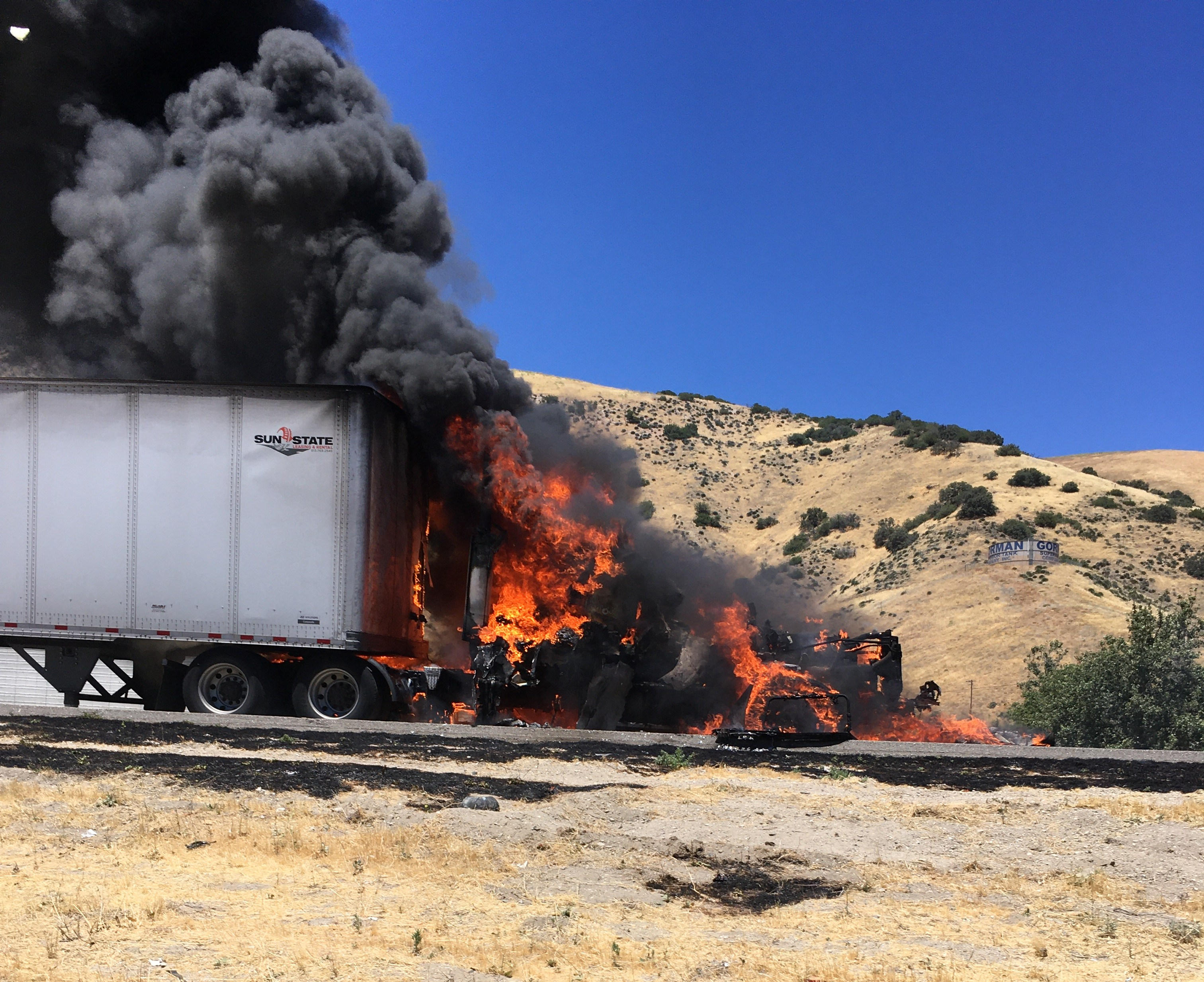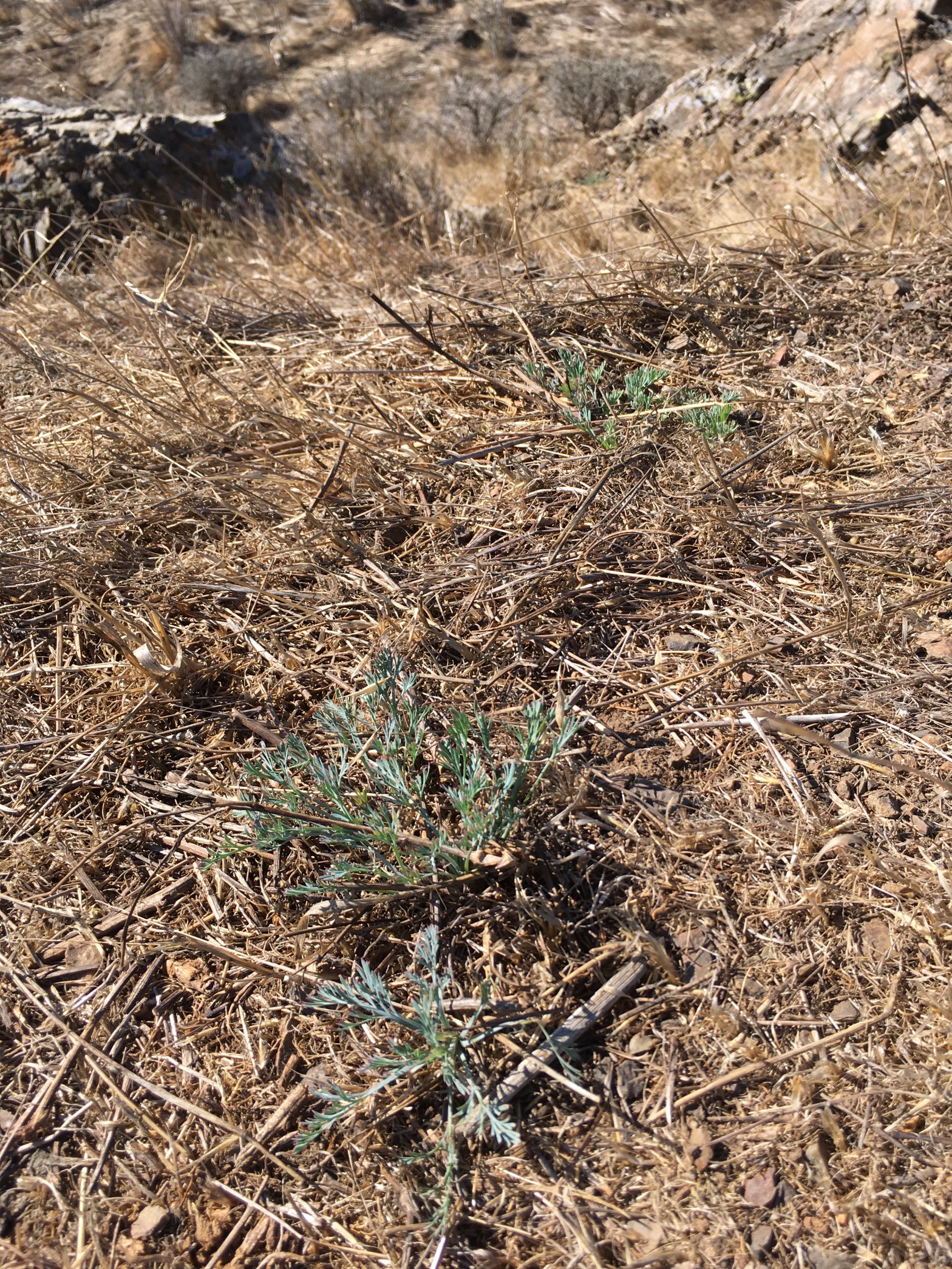Dear Colleagues,
This is call to action now!
This week, the Texas Senate is expected to debate and pass two bills that would take effect at all public colleges and universities in Texas on Sept. 1, 2023:
· Senate Bill 18 to eliminate granting of tenure for all faculty members, and
· Senate Bill 17 to ban DEI offices, officers, programs, and practices.
And the Senate has already passed
· Senate Bill 16 to restrict academic freedom and critical thinking in courses and research.
Penalties for violating either SB 16 or SB 17 is employment termination, regardless of tenure status. By Friday, these bills will be sent to the House for deliberation.
After describing actions to take on the bills, I’ll describe the content, impact and talking points of these bills, followed by references. I am speaking for myself as a private citizen.
Take Action. Getting alumni, research partners, and community leaders on board in addition to faculty, staff and students will be key in defeating these measures, esp. in the House.
Amplify the message. Make calls or meet with 10 people in your network – former students as well as companies and community leaders – to discuss the impact of SB 16, 17 and/or 18 by using the talking points in after this section. Don’t stop the communication until they can commit to taking at least two or more actions as private individuals representing themselves:
o Join Defend Campaign (next item)
o Visit their Texas Senate and House reps in their local offices — see Who Represents me?
o Meet with House Higher Education Committee members
o Email staff for House Higher Education Committee members handling higher ed [10]
o Testify on these bills at the House Higher Ed Committee meetings on Mondays 10am
o Follow our Bill Tracker, and @TexasAaup and @aaup_utAustin on Twitter, for updates
o Ask people at companies to contact their Government Relations team to ask them to consider doing the above (e.g. testify “on” a bill to provide info about its impact).
o Contact 10 other people to amplify the message
Join the Defend Campaign
o Sign the Texas AFT Defend Tenure, DEI & Academic Freedom campaign to ask your Texas Senator to vote against SB 17/18, and you can edit the draft letter to your liking
o Post, tweet, e-mail, text the Defend Tenure, DEI & Academic Freedom campaign and op-eds & articles [6-9] to faculty, students, alumni, parents, and community and business leaders from personal and other non-State accounts
o Automate e-mail and text to join the campaign using Impactive App using code 851761
E-mail all Senators and House members from a personal or other non-State account, e.g. using the talking points below. Their e-mail addresses are in [11][12].
Eliminating Future Granting of Tenure. Senate Bill 18 removes the possibility of tenure for faculty currently on the tenure track at Texas public colleges and universities including 400 Assistant Professors at UT Austin and 700 Assistant Professors at Texas A&M [1]. Tenure-track faculty are rigorously evaluated in teaching, research, and service over a six-year period, and the 50% that do not earn tenure in the United States are dismissed from their positions. Tenure is a necessary safeguard for academic freedom in teaching, research, and expression. Academic freedom is freedom from censorship from the institution or the government. Tenure protects professors in developing and disseminating new knowledge from all viewpoints, including conservative, moderate, liberal, and apolitical. Tenured faculty take on the long-term curriculum development, research projects, and leadership positions vital to students. Tenure is part of the national faculty job market — more than 800 colleges and universities in the US have adopted the AAUP principles on academic freedom and tenure, including the top schools. [5] Tenured and tenure-track faculty at universities are vital for a university to graduate the PhD students and land the grants to become a Tier-1 or Tier-2 university. [1] About 50% of the faculty at UT Austin and 70% at Texas A&M are either tenured or on the tenure track, which is common for a Tier-1 Doctoral Granting University. [1] There are no other bills similar to SB 18.
Talking points of the impact of Senate Bill 18:
· SB 18 eliminates granting of tenure after Sept. 1, 2023, at public institutions of higher ed
· Tenure is necessary safeguard for academic freedom in teaching, research, and expression
· Current tenure-track faculty will seek tenure-track and tenured positions elsewhere
· Public colleges/universities would no longer be able to recruit tenure-track/tenured faculty
· Due to the starvation of the tenure pipeline, tenured faculty members will leave.
· Texas public colleges and universities will lose quality, prestige, and rankings
Discontinuing Diversity, Equity, and Inclusion (DEI) Efforts. Senate Bill 17 bans DEI offices, officers, programs, and practices, and penalties include termination of employees and loss of state funding. DEI is not a single, clearly defined program, but rather a broad set of policies and practices designed to foster student access and resilience, reduce discrimination, and improve institutional life. [2] Enrolling a college is a major transition for students, and DEI programs help students adjust, adapt, and thrive inside and outside the classroom while enrolled. DEI helps students better relate to people from different backgrounds their own, which will help our students when they are in a diverse work environment. SB 17 will lead to loss of accreditation in social work, law, and many other disciplines as well as endanger the mission, status, and funding for the 76 Hispanic Serving Institutions [3] and 2 Historically Black Colleges and Universities among our public colleges and universities. Moreover, DEI requirements are now built into nearly all federal grant mechanisms in STEM including Dept. of Energy Office of Science, National Science Foundation, and National Institutes of Health, which together awarded nearly $40B in grants to higher ed in FY 2022. [4] Without DEI programs, Texas public colleges and universities would lose an estimated $1-2B of their $4B in annual external research expenditures from non-State sources. [4] Bills similar to SB 17 include HB 1607 and HB 5127, and both the House and Senate budgets contain amendments banning DEI practices.
Talking points of the impact of Senate Bill 17 include
· SB 17 bans DEI programs and practices at public institutions of higher ed
· DEI fosters student access and resilience, reduces discrimination, and improves campus life
· SB 17 penalties (termination of employees and loss of state funding) creates chilling effect
· We will lose money, and the opportunity to improve the world by elevating those around us
· We will lose faculty and students whose work depends upon a DEI infrastructure.
· Texas public colleges and universities will lose quality, prestige and rankings
Restricting Academic Freedom and Critical Thinking. Senate Bill 16 says that a faculty member “may not compel or attempt to compel a student enrolled at the institution to adopt a belief that any race, sex, or ethnicity or social, political, or religious belief is inherently superior to any other race, sex, ethnicity, or belief” and has a penalty of termination for the faculty member for violating this provision, regardless of tenure status. Anyone may file a complaint against a faculty member, including students who are unsatisfied with a grade they have received on an assignment. The language “compel or attempt to compel” is vague and open to wide interpretation. The bill is a clear violation of free speech and academic freedom. Academic freedom is the freedom from censorship by the institution or government, which is adopted by more than 800 colleges and universities in the US. [5] Companion bills to SB 16 include SB 2313, HB 1006, HB 1046, HB 3164, HB 3682, HB 5001, and HB 5140.
Talking points of the impact of Senate Bill 16 include
· SB 16 limits academic freedom on teaching
· SB 16 creates a chilling effect on teaching, research, and expression on any subject related to race, sex, ethnicity or social, political, or religious belief due to fear of faculty losing their job
· Professors will be unable to have students think critically in courses and research on these topics who then will not be prepared to work in diverse workplaces
· We will lose faculty and students to other institutions that safeguard academic freedom,
· Texas public colleges and universities will lose quality, prestige and rankings
References
[1] Brian Evans, “Tenured and Tenure-Track Faculty in the US, Texas A&M & UT Austin”,Apr. 3, 2023.
[2] Pat Heintzelman, Testimony on SB 17, April 6, 2023 Testimony on SB17
[3] Excelencia in Education, “A Texas Briefing of 25 Years of HSIs”, 2021. 74 public Hispanic Serving Institutions (HSIs) are in Texas. UT Austin and Texas A&M became HSIs after the report issued.
[4] Brian Evans, Andrea Gore, Brian Korgel, Diana Marculescu, and Angela Valenzuela, “How Senate Bill 17 and Banning Diversity, Equity and Inclusion (DEI) Jeopardizes University Research Funding: A STEM Perspective“, Apr. 15, 2023.
[5] The American Association of Colleges and Universities co-formulated principles of academic freedom and tenure with the American Association of University Professors and has 848 college and university members.
[6[ Karma Chavez, “Opinion: Equity, inclusion, and access don’t divide us. They bring us together”, Austin American-Statesman, April 16, 2023.
[7] Kate McGee, “How Republicans’ threats to tenure and diversity might undercut their own efforts to advance Texas’ universities”, Texas Tribune, April 11, 2023. Quotes AAUP members Karma Chávez, Brian Evans, and Andrea Gore.
[8] Christine Julien, “DEI: What it is and why it matters in engineering“, Dallas Morning News, April 1, 2023.
[9] Andrea Gore, “UT scientist: Killing tenure would ruin the state’s research universities“, Houston Chronicle, March 24, 2023. Andrea Gore is an AAUP Member.
[10] Here are the staff members who handle higher ed issues for members of the House Higher Ed Committee – please send thoughtful e-mail messages to engage in a dialogue – spamming them will be counterproductive:
- Anna Hynes Anna.Hynes@house.texas.gov for Rep. Raney
- Andrew Fuller Andrew.Fuller@house.texas.gov for Rep. Burns
- Ashika Ganguly Ashika.Ganguly@house.texas.gov for Rep. Bucy
- Britton Davis Britton.Davis@house.texas.gov for Rep. Clardy
- Tyler Gustafson Tyler.Gustafson@house.texas.gov for Rep. Paul
- Brittney Madden Brittney.Madden@house.texas.gov for Rep. Kuempel and Clerk for the Committee
- Ted Raab Ted.Raab@house.texas.gov for Rep. Mary Gonzalez
- Decker Reno Decker.Reno@house.texas.gov for Rep. Burrows
- Samantha Lopez-Resendez samantha.lopez@house.texas.gov for Rep. Donna Howard
- Jake Salinas Jake.Salinas@house.texas.gov for Rep. Sheryl Cole
- Kimberly Zavala Kimberly.Zavala@house.texas.gov for Rep. Lalani
[11] Eli Melendrez, Texas American Federation of Teachers, provided the list of the e-mail addresses for all Texas Senate members: carol.alvarado@senate.texas.gov, paul.bettencourt@senate.texas.gov, brian.birdwell@senate.texas.gov, cesar.blanco@senate.texas.gov, donna.campbell@senate.texas.gov, brandon.creighton@senate.texas.gov, sarah.eckhardt@senate.texas.gov, pete.flores@senate.texas.gov, roland.gutierrez@senate.texas.gov, bob.hall@senate.texas.gov, kelly.hancock@senate.texas.gov, juan.hinojosa@senate.texas.gov, joan.huffman@senate.texas.gov, bryan.hughes@senate.texas.gov, nathan.johnson@senate.texas.gov, phil.king@senate.texas.gov, lois.kolkhorst@senate.texas.gov, morgan.lamantia@senate.texas.gov, jose.menendez@senate.texas.gov, mayes.middleton@senate.texas.gov, borris.miles@senate.texas.gov, robert.nichols@senate.texas.gov, tan.parker@senate.texas.gov, angela.paxton@senate.texas.gov, charles.perry@senate.texas.gov, charles.schwertner@senate.texas.gov, kevin.sparks@senate.texas.gov, drew.springer@senate.texas.gov, royce.west@senate.texas.gov, john.whitmire@senate.texas.gov, judith.zaffirini@senate.texas.gov
[12] Eli Melendrez, Texas American Federation of Teachers, provided the list of the e-mail addresses for all Texas House members:
alma.allen@house.texas.gov, steve.allison@house.texas.gov, rafael.anchia@house.texas.gov, charles.anderson@house.texas.gov, trent.ashby@house.texas.gov, ernest.bailes@house.texas.gov, cecil.bell@house.texas.gov, Keith.bell@house.texas.gov, diego.bernal@house.texas.gov, salman.bhojani@house.texas.gov, greg.bonnen@house.texas.gov, rhetta.bowers@house.texas.gov, john.bryant@house.texas.gov, brad.buckley@house.texas.gov, john.bucy@house.texas.gov, ben.bumgarner@house.texas.gov, dewayne.burns@house.texas.gov, dustin.burrows@house.texas.gov, angie.button@house.texas.gov, briscoe.cain@house.texas.gov, elizabeth.campos@house.texas.gov, terry.canales@house.texas.gov, giovanni.capriglione@house.texas.gov, travis.clardy@house.texas.gov, sheryl.cole@house.texas.gov, nicole.collier@house.texas.gov, david.cook@house.texas.gov, philip.cortez@house.texas.gov, tom.craddick@house.texas.gov, charles.cunningham@house.texas.gov, drew.darby@house.texas.gov, yvonne.davis@house.texas.gov, mano.deayala@house.texas.gov, jay.dean@house.texas.gov, mark.dorazio@house.texas.gov, harold.dutton@house.texas.gov, lulu.flores@house.texas.gov, james.frank@house.texas.gov, frederick.frazier@house.texas.gov, erin.gamez@house.texas.gov, josey.garcia@house.texas.gov, gary.gates@house.texas.gov, stan.gerdes@house.texas.gov, charlie.geren@house.texas.gov, barbara.gervin-hawkins@house.texas.gov, craig.goldman@house.texas.gov, jessica.gonzalez@house.texas.gov, mary.gonzalez@house.texas.gov, vikki.goodwin@house.texas.gov, bobby.guerra@house.texas.gov, ryan.guillen@house.texas.gov, sam.harless@house.texas.gov, caroline.harris@house.texas.gov, cody.harris@house.texas.gov, brian.harrison@house.texas.gov, richard.hayes@house.texas.gov, cole.hefner@house.texas.gov, ana.hernandez@house.texas.gov, abel.herrero@house.texas.gov, gina.hinojosa@house.texas.gov, justin.holland@house.texas.gov, donna.howard@house.texas.gov, lacey.hull@house.texas.gov, todd.hunter@house.texas.gov, carrie.isaac@house.texas.gov, jacey.jetton@house.texas.gov, ann.johnson@house.texas.gov, jarvis.johnson@house.texas.gov, julie.johnson@house.texas.gov, jolanda.jones@house.texas.gov, venton.jones@house.texas.gov, kyle.kacal@house.texas.gov, ken.king@house.texas.gov, tracy.king@house.texas.gov, stan.kitzman@house.texas.gov, stephanie.klick@house.texas.gov, john.kuempel@house.texas.gov, suleman.lalani@house.texas.gov, stan.lambert@house.texas.gov, brooks.landgraf@house.texas.gov, jeff.leach@house.texas.gov, terri.leo-wilson@house.texas.gov, oscar.longoria@house.texas.gov, janie.lopez@house.texas.gov, ray.lopez@house.texas.gov, jm.lozano@house.texas.gov, john.lujan@house.texas.gov, christian.manuel@house.texas.gov, trey.martinezfischer@house.texas.gov, mando.martinez@house.texas.gov, will.metcalf@house.texas.gov, morgan.meyer@house.texas.gov, terry.meza@house.texas.gov, joe.moody@house.texas.gov, penny.moralesshaw@house.texas.gov, christina.morales@house.texas.gov, eddie.morales@house.texas.gov, geanie.morrison@house.texas.gov, sergio.munoz@house.texas.gov, andrew.murr@house.texas.gov, victoria.neavecriado@house.texas.gov, candy.noble@house.texas.gov, tom.oliverson@house.texas.gov, claudia.ordaz@house.texas.gov, angelia.orr@house.texas.gov, lina.ortega@house.texas.gov, jared.patterson@house.texas.gov, dennis.paul@house.texas.gov, maryann.perez@house.texas.gov, dade.phelan@house.texas.gov, mihaela.plesa@house.texas.gov, four.price@house.texas.gov, ana-maria.ramos@house.texas.gov, john.raney@house.texas.gov, richard.raymond@house.texas.gov, ron.reynolds@house.texas.gov, glenn.rogers@house.texas.gov, ramon.romero@house.texas.gov, toni.rose@house.texas.gov, jon.rosenthal@house.texas.gov, matt.schaefer@house.texas.gov, nate.schatzline@house.texas.gov, mike.schofield@house.texas.gov, matt.shaheen@house.texas.gov, carl.sherman@house.texas.gov, hugh.shine@house.texas.gov, bryan.slaton@house.texas.gov, shelby.slawson@house.texas.gov, Reggie.smith@house.texas.gov, john.smithee@house.texas.gov, david.spiller@house.texas.gov, lynn.stucky@house.texas.gov, valoree.swanson@house.texas.gov, james.talarico@house.texas.gov, carl.tepper@house.texas.gov, shawn.thierry@house.texas.gov, kronda.thimesch@house.texas.gov, ed.thompson@house.texas.gov, senfronia.thompson@house.texas.gov, tony.tinderholt@house.texas.gov, steve.toth@house.texas.gov, ellen.troxclair@house.texas.gov, chris.turner@house.texas.gov, gary.vandeaver@house.texas.gov, cody.vasut@house.texas.gov, hubert.vo@house.texas.gov, armando.walle@house.texas.gov, terry.wilson@house.texas.gov, gene.wu@house.texas.gov, erin.zwiener@house.texas.govBest,
Brian
Brian L. Evans, PhD | He/His/Him
Member, American Association of University Professors, AFT, AFL-CIO
Vice President, Texas AAUP Conference
Speaking for myself as a private individual
Book ms sent in
On March 1 Joe and I sent the manuscript of our book in to Pluto, our publisher in the UK. It will come out as part of the Wildcat series, which we’re excited about. We expect it to be out by August so we can take it to the COCAL conference in Mexico City (assuming COVID has settled down — we both have had two shots by now).
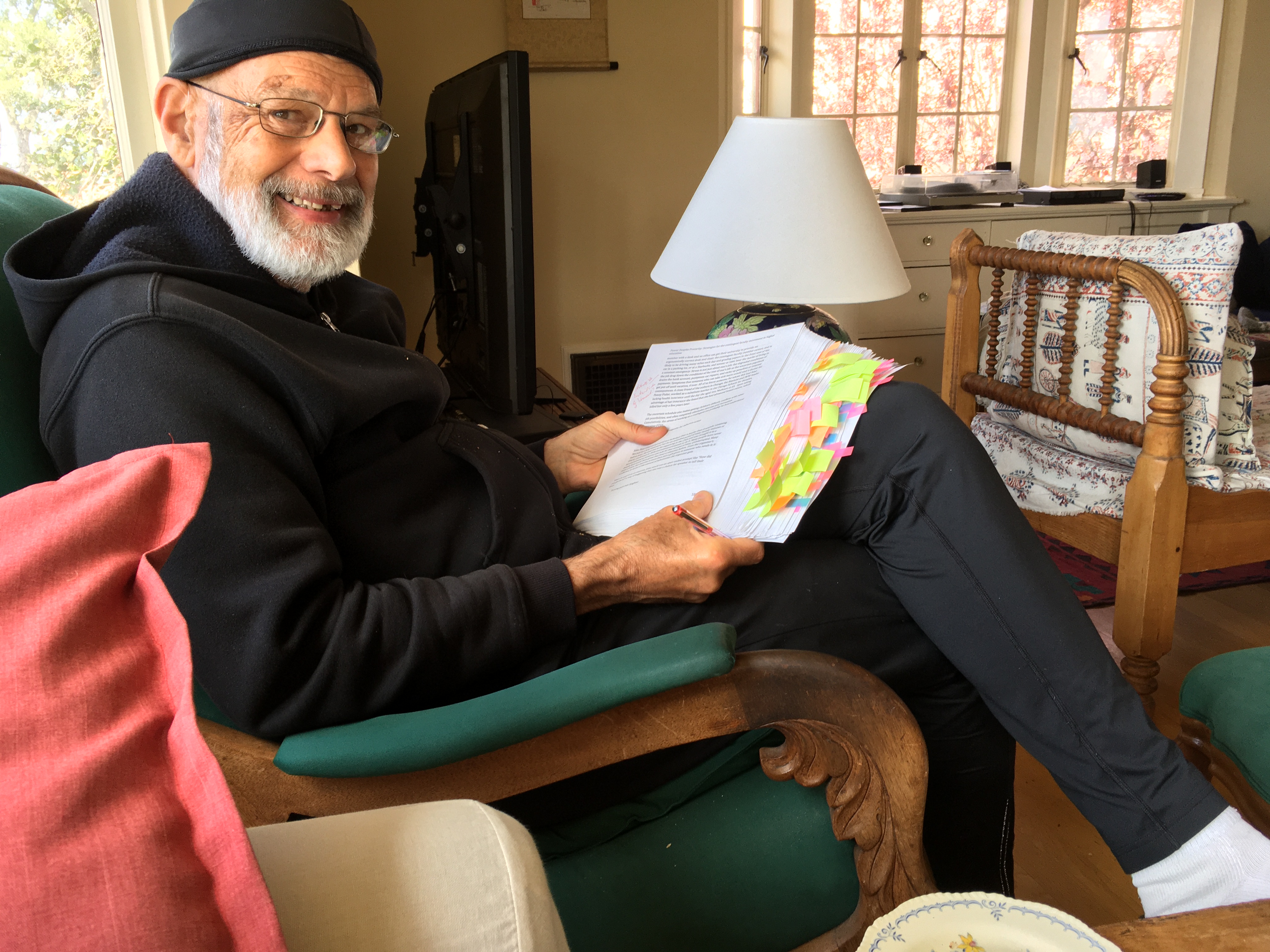

Here is Joe reading through the whole thing again, tabbing pages where he thinks something should be changed or corrected.
All this is to say that there will be a separate blog for this book. I hope it will become an interactive space for contingents who will write in or write about what it’s like to teach, organize and represent workers under precarious employment conditions. It will also try to track some of the whopping changes being made in higher ed — like universities that are “re-writing” the tenure rules. At SF City College , by the way, about 165 tenured profs got March 15th pink slips. This is COVID disaster capitalism. Waiting for it to blow over is not a strategy.
The name of this other blog will be the same as the title of the book: Power Despite Precarity: Strategies for the Contingent Faculty movement in Higher Education. Right now there’s a good description of it on Patrick Sullivan’s blog, Teacher-Scholar-Activist.
Nov 7, NYTimes calls for Biden
The green whiskers are the beginnings of California poppies which appear to be growing despite lack of rain and location atop steep dry stony hills where strong winds blow off the Bay.
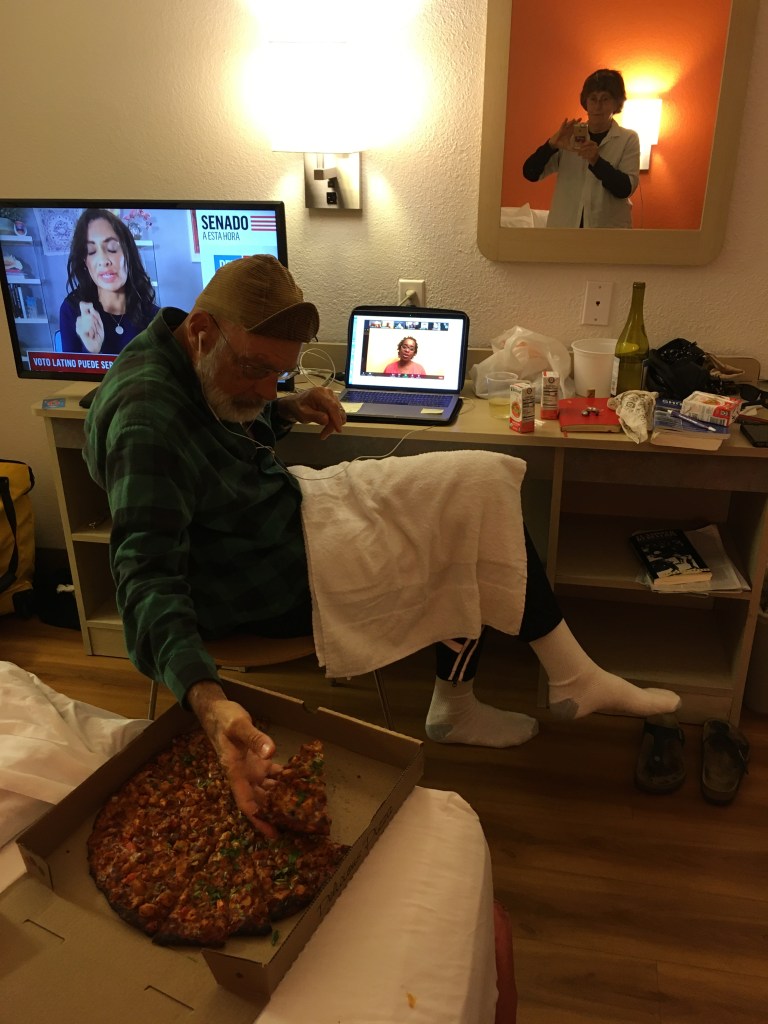
The night of November 5, election day, I met Joe down in Fremont. He had just completed four fifths (or actually 13/14ths) of his bike ride around the San Francisco Bay on the Bay Trail. He got a room at the Motel 6 and we turned on our various devices to watch or not watch as the evening passed. Kind of a bomb shelter. But a perfectly nice clean place to sleep and use the internet. He went out and got a bottle of Chardonnay at the Lucky’s and I ordered a pizza from a nearby Indian food pizza place.
No news came in that night.
The next day Joe took off to bike north for his last day, 41 miles, and I went back to Coyote Hills and tried to walk off the tension.
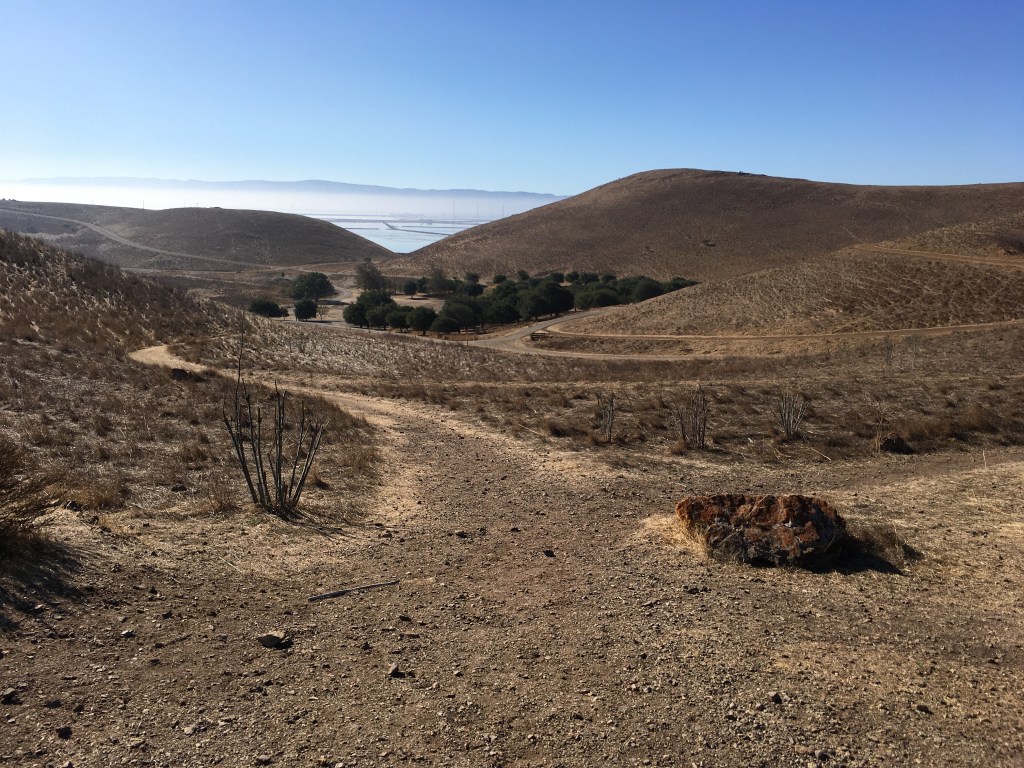
Beautiful, dry landscape. We need our parks desperately. That’s the salt ponds in the distance, marsh reclamation. Drought. Usually at this time of year these hills are emerald green.
Wednesday, Thursday, Friday the news drips in. I check the count about once an hour.
Saturday morning, the NYTimes calls Biden’s win in Pennsylvania which gives him the Electoral College. Then Arizona and Nevada. Dancing in the streets in Philadelphia and Berkeley. A celebration taking place down at the fountain near us.

Cars honking, kids out in the fountain circle, the toxic venom begins to drain away. Take a deep breath.
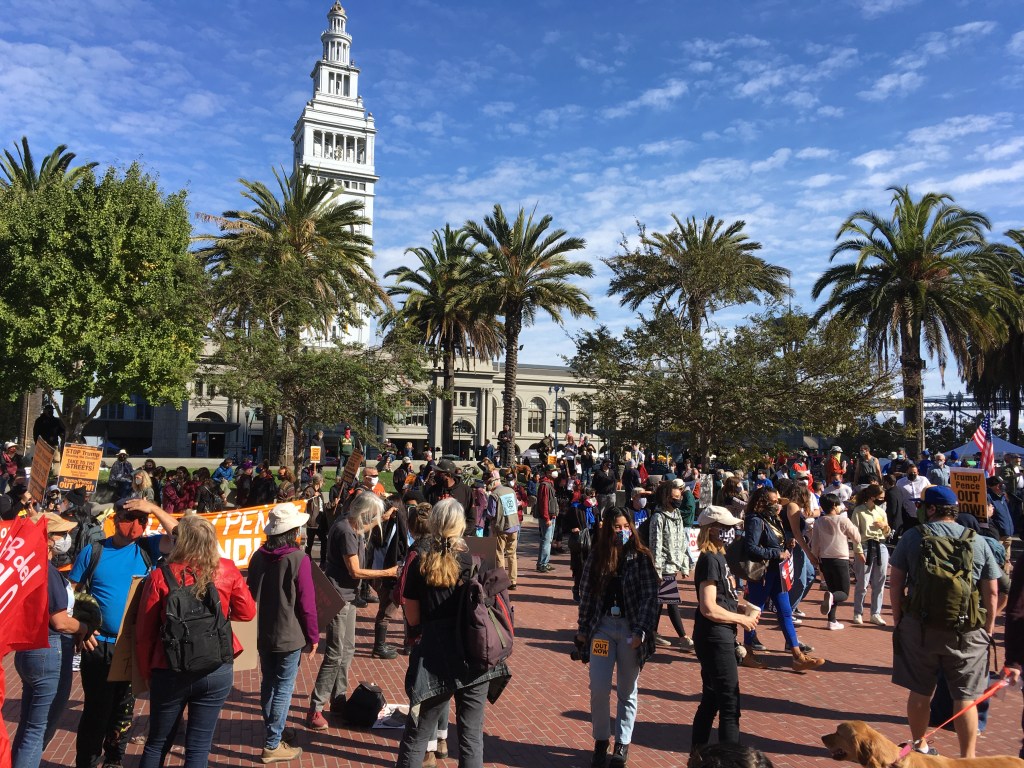
Joe goes to a count every vote demo in San Francisco. it turns into a celebration.

There was real live danvingh in the street around Lake Merritt. So much so that we drove over ther to see it and found ourselves in a traffic jam like nothing I’ve ever seen, but all honking, costumes, music everywhere.
And then things get back to normal. Biden won the presidency but the Democrats lost seats in the House and will have to fight in Georgia to win the Senate. On the other hand 74% of the Our Revolution candidates, all over the country (that’s Bernie’s organization) won their races. In the City of Detroit, Biden got 92% of the vote, which is kind of amazing to even hear about — that’s the margin by which he won Michigan. In other words, where the progressive left candidates ran on a clearly left basis, we won. Where the Democrats won on a soft, Obama-type basis, they lost.
So here in Berkeley we can go back to playing music in the sun for our neighbors.
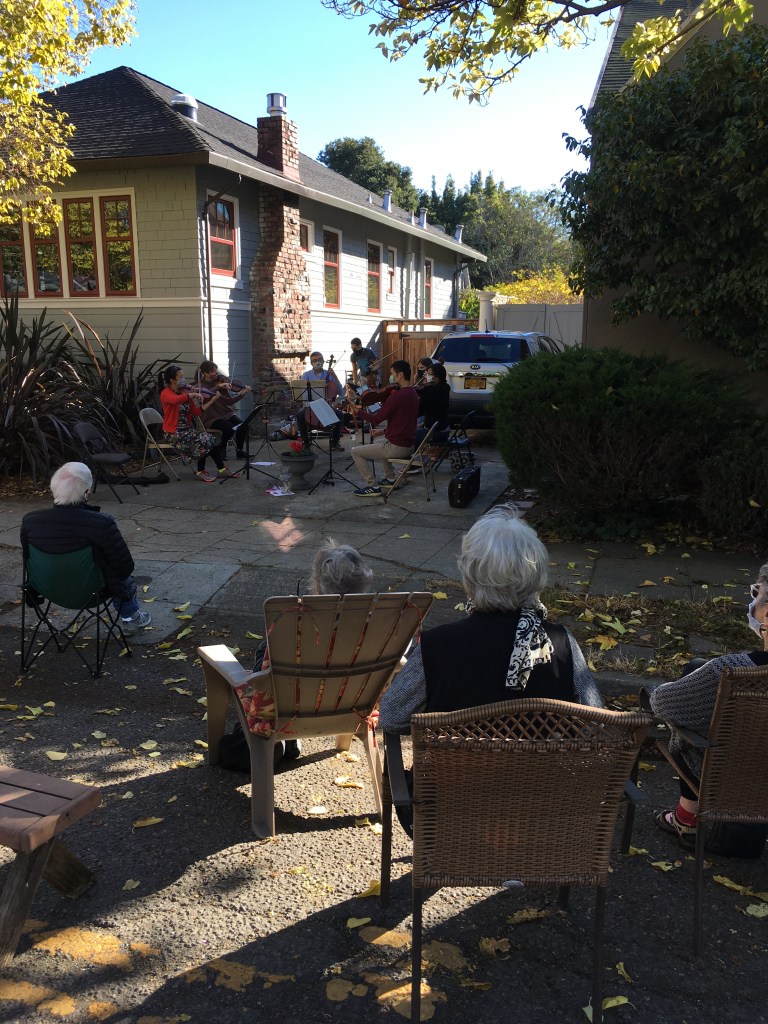
Joe quits, I go missing
Joe wrote this to his various email correspondents:
Friends, comrades, fellow workers,
I am writing this note to all those I have been working with on my various projects up to the present. There are too many just now and I am feeling overwhelmed, probably exacerbated by the COVID restrictions, the wildfire smoke, the continuing crisis in my union, a lack of proper exercise, and the general instability of our world just now (not to mention incipient fascism, impending economic depression, continuing “law enforcement” murders, etc.).
Therefore, I have decided to take at least a month to radically cut back to these few tasks:
1. Finishing the book with Helena Worthen, (working title: The Fifth Transition: A Strategy for the Contingent Faculty Movement)
2. Keeping up with COCAL UPDATES, the news aggregator I have done for 20 years. (This means reading my email, but deleting lots.)
3. Maintaining the Labor For Bernie Bay Area list and periodic news messages, with my valued partner Larry Hendel.
4. Planning and executing the long-delayed ride around the Bay following the nearly-completed Bay Trail on my bike. This last, of course, depends on both the climate/weather/wildfires cooperating and the reopening post COVID of hotels, campgrounds and eateries. I will be sending out an itinerary to my friends who bicycle with an invitation to join me on all or part of the ride. If you want to get it, just reply to this email.
5. More regular exercise and recreation (yoga, biking, walking, personal bodily and psychological maintenance) and some socializing with old and new friends and family.
I apologize in advance for the inevitable inconvenience this will cause my many “partners in crime”. What follows is a hopefully-complete list of the projects I will be absent from for this duration. I thank in advance all those who will inevitably have to perform the tasks that I will not for this period.
AFT 2121 Exec Bd rep for retirees Affirmative /Action Task Force and “white guys” affinity group AFT 2121R secretary Informal working group on taxes work on Prop 15, 16 and 22 and candidate campaigns
other ad hoc subgroups in and around Local 2121 and Local 2121 R
Coalition of Contingent Academic Labor (COCAL) International Advisory Committee
New Faculty Majority Board and various subgroups thereof
East Bay Democratic Socialists of America Labor Committee (and the education subcommittee thereof) Emergency Worker Organizing Committee Higher Educators United coalition
Various writing, editing and reviewing projects
Thanks to you all in advance. I am trying today and tomorrow to wrap up the essential loose ends before my partial “exit”. I realize this a largely a problem of my own creation and I am finally deciding to attempt to take some action to correct it. I expect that, when I return, it will be in a better state of mind than when you last encountered me. I certainly hope so. Feel free to share this with relevant folks I may have missed.
In solidarity,
Joe
I go missing
https://images.app.goo.gl/r9pvo2MjrBLovJFS8
It was definitely related to the COVID-19 thingie which has been going on for seven months now, but then the wildfires and the black sky and the evil air were really too much. Of course that’s nothing compared to places where people are actually getting burned up. And it’s nothing compared to Chernobyl (a name that kept coming into my mind as I started to lose it this week) or Sudan, or Katrina (would I have broken through the roof of my house in the 9th ward and waved for someone in a boat or a helicopter to come pick me up?), nothing! Or all those migrants on boats trying to get from Libya to Malta.
Do most kids who try to imagine who they would be in a different time Egypt, the Pharoahs, for example) imagine they were princesses? Or do they picture themselves on an overloaded boat in the Mediterranean?
So I was trying to sew a pair of black linen pants. I ordered the linen from StoneMountain Daughter, 2 yards at $23 per yard, Venice Black. It said “wash cold hang dry,” but nothing I wear doesn’t go through the hot and the dryer at some point, so I always wash cloth before I sew it. It turned out that it sure did have a lot of filler and clogged up the drain, but that was OK.
I cut the pattern and made adjustments. I filled a new bobbin. My sewing machine is my grandmother’s, 1926 or earlier; a Singer, totally good machine but it doesn’t sew backwards. No problem.
The washed and dried linen, it turned out, was very hairy. It stuck in the bobbin. Also, I had the wrong thread. But nevertheless. I sewed. Tuesday, Wednesday. The problem with black is that with a hazy sky, there’s not enough light to really see what you’re doing. Also, I’m 76 years old and my eyesight is not magnificent. Also, I’m sewing with black thread on black linen. Furthermore, one thing I like to do with pants and many other items is French seams — you first sew it one way, then you reverse it and sew the seam the other way so that the raw edge is inside. That helps if you intend to put it all in the wash some day. But which is the right side and which is the wrong side? And I also like inseam pockets, which requires a certain amount of thinking ahead.
So a pair of pants that should have taken an hour to cut and an hour to sew were well into 6 hours this afternoon of the second day. And I began to have thoughts like this:
If I were the Queen of England, I wouldn’t be doing this. I would have someone else do it for me.
If I were the Queen of England, or maybe what if I am actually the Queen of England, and they haven’t notified me?
Or maybe I’m just Meghan married to Henry, right, and they haven’t notified me?
That’s Trump, who is messing with the Post Office, and he’s doing it again, that’s why I haven’t gotten my notification.
At this point I began to have a little critical distance on my thought process.
But still, given the pandemic and the wildfires, it didn’t seem altogether like such a terrible idea. So I went with it. What’s the problem, here? Mistaken identity!! They think I’m Helena Worthen trying to sew a pair of linen pants, and having to take out a whole goddamn seam that I sewed back to front or back to back, but actually I’m British royalty.
Who can I tell about this? Who can I confide in? Who can I trust? Not Joe. He wouldn’t want to be married to British Royalty. He didn’t even want to be married to someone who owns a house!! (He has calmed down about that.) So who can I tell about who I truly am, but just haven’t been notified? Can I tell the kids? The son in LA wouldn’t care; sounds like more responsibility, actually. Daughter might want more details if it involves dragons. Grandkids might enjoy it — but practically speaking, what does it involve? Any nice property? How far away? Does it have internet?
So actually, if I’m here in Berkeley on day two of trying to sew a pair of black linen pants while I’m actually British Royalty gone missing, it’s just one step from mistaken identity to joining the Witness Protection Service and really go missing. In fact, if I remember correctly, WPS comes with a ticket out of California to some Dream Vacation Location like Chicago where there are no wildfires, yet. The house two down from us in Chicago, on Flournoy, for example, was definitely a Witness Protection housing joint. I explored it one late afternoon while it was still under construction — five stories, huge master bedroom and big bathroom, deep garage for multiple vehicles. When they finished the construction it got locked up tight, no more exploring, you couldn’t see in anywhere, tight as a drum. No windows into the garage. A camera looking at me.
Then two giant tractor trailer trucks arrived with furniture from Marshall Fields and it all got loaded in in one day, everything from sofas to drapes to light fixtures. Then it shut back down again for a couple of months until Columbus Day when there was an Italian-American festival on the street and a big family came out and sat on the steps and everyone waved. They didn’t mingle, though. Then they went back in and locked the doors.
That’s the life for me.
Permanent crises
Not good. This is what the sky looked like at 10 am Wednesday the 9th.

Chernobyl, volcanos, etc.
Sunday it was up over 100 degrees. I could not think. Brains are protein and cook. It was too hot to wear a metal necklace. Many things that needed doing did not get done. Then this morning it was cold. I had to turn the furnace on and put on warm socks.
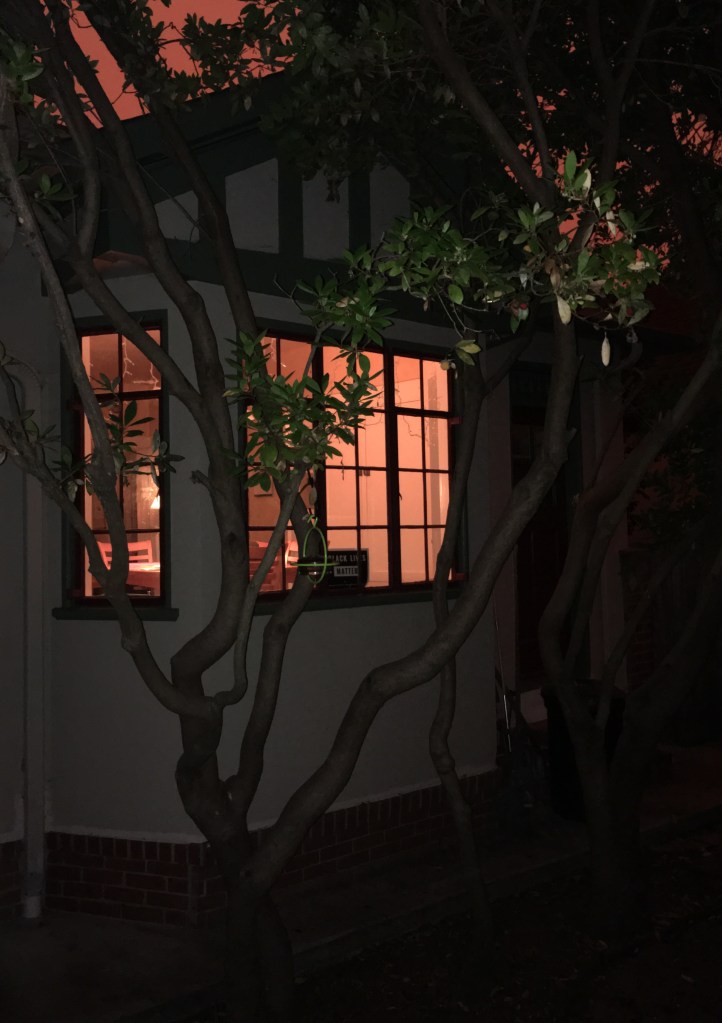
Meanwhile in Rochester, New York, a mentally ill Black man ran down the street naked. He was grabbed by cops who hooded him with a “spit hood” like in the Abu Graib photos, and killed him. After that, protestors kneeled naked in the street (the photos show Black and white people) and the Chief of police resigned, as did the next in command. The Mayor supported the protests.
Both the climate crisis and the mounting protests are apparently permanent things that we live with now. And then there’s COVID-19. The fires will burn as long as there’s fuel, the protests will continue until we either win or lose, and COVID will eventually reach everyone unless everyone quarantines so that it has no place to jump. Our granddaughter who is living in a sorority house at San Diego State has tested positive, by the way — so has her whole house, and so has her boyfriend’s fraternity.
This came up because our book has now been in the hands of Pluto Press for 6 months and there’s been various kinds of COVID-related postponements and promises. Joe said, “Things are pretty unstable and so it’s hard to plan.” He was referring, it turns out, to his bike ride around the Bay. I thought he was referring to the book. But “unstable” also meant, at least at the start of our conversation, the weather and the political moment. On the contrary. They are neither of them unstable. Permanent continuous variation is stable. The climate crisis is permanent. We are in it. The political moment, related to our human use of each other and our planet, is permanent, too. Our vulnerability to pandemics is permanent.
Permanent, but also rising: the climate crisis and the political conflict are getting more intense. They will not be settled by the election. Best case scenario, we will win and then the climate change will continue and the protests will pause briefly and then swing back up. Worst case, etc etc. the same, but with no pause.
If I did a 360 degree circle around my friends, I’d say staying in touch is the main thing that is going on. And hoping. And reading the news, which comes in increasingly incomprehensible (or too comprehensible) chunks. A very weird ad in the SF Chronicle, apparently purchased by an elderly couple who live around here, urges people to refrain from using the post office during the run up to the election, so that ballots can go through, and also that we should raise an army of volunteer mail sorters.
We’re preparing a reading group plan for DSA about organizing in the 1930s; a friend of mine asked, “Why not Germany in the 1930s?”
But there is still food:
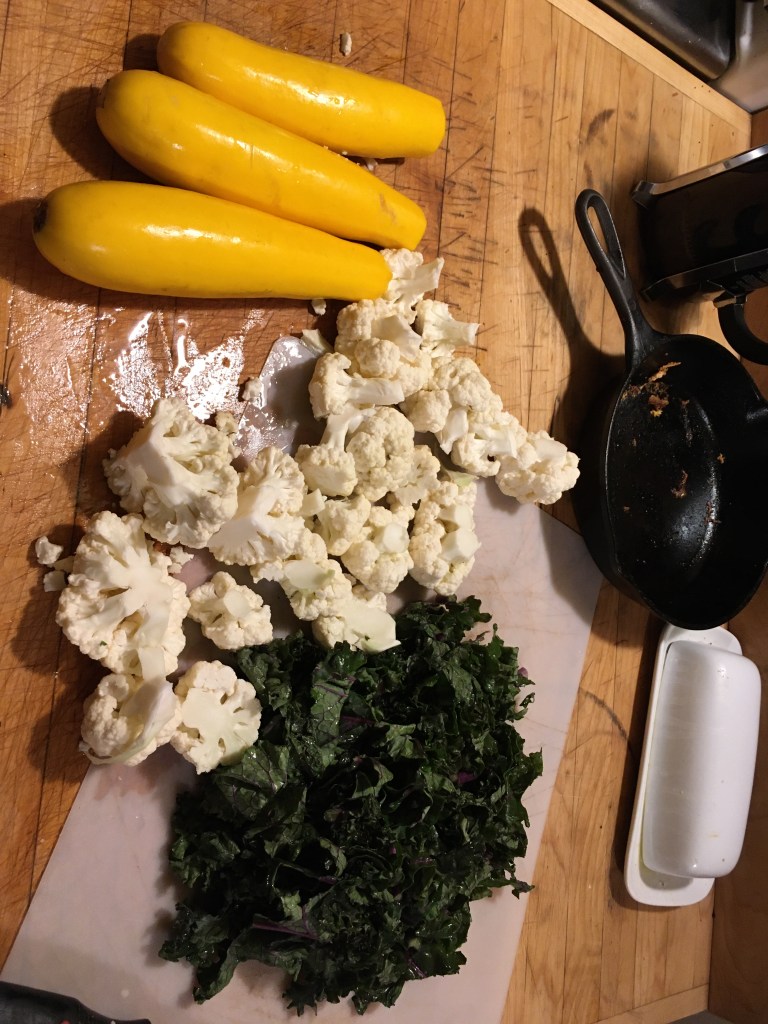
The above, first steamed together then served with rice, and then spun up as soup the next day with salt and cream, makes a great meal.
Thinking about who is on which side, as these protests spread. How about the sufferers? The detained immigrant families, the men and women in prison? Are they part of the protests? Certainly — suffering is protest that is below one’s ability to express it or act upon it.
It was Wednesday so we showed up at 6 pm for The Wave. It was so dark that people arrived with flashlights and iphones burning. It must have lightened up a bit for this picture. Note down jackets, two days after we were boiling hot.
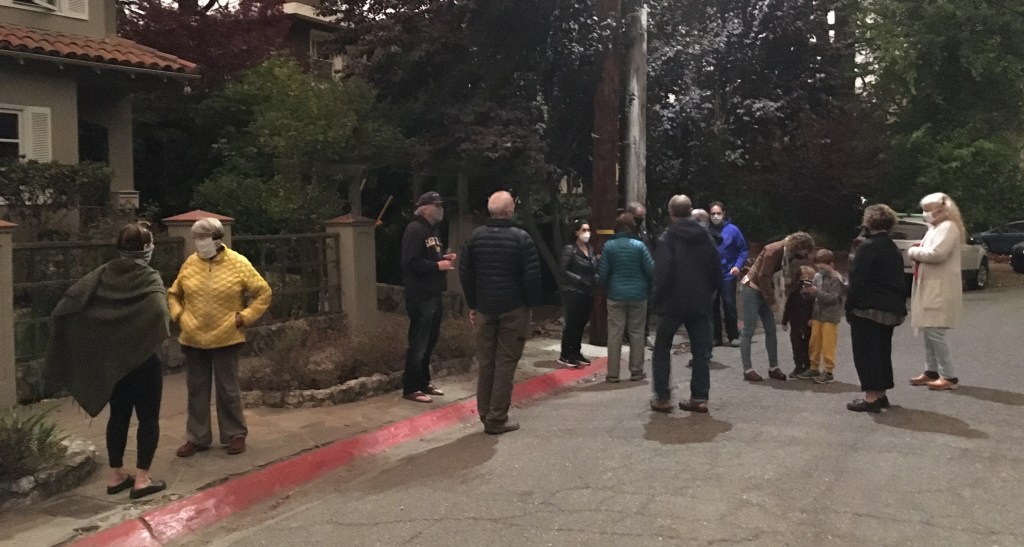
Wildfires, protests
Since I wrote last, wildfires have started. Wildfire season used to be October, by the way, not August. We actually didn’t used to call it wildfire season.
The coastal mountains near Santa Cruz — where we were last time I wrote — started burning, not because the electricity-bearing PG&E utility wires blew down and sparked fires, but because of dry lightning that came from the edge a giant storm out in the Pacific. That fruit stand, Swanton’s, that I showed in my last post, gets its strawberries from fields that workers tried to save from smoke damage by covering them with tarps. There were also fires to the north, same cause. That meant that the air in the Bay Area went dark and stinky. We were all checking purpleair.com several times a day to see how bad it was.
We spent two days in the mountains south of Tahoe. This is what the Central Valley looked like coming down out of the mountains: Pink with smoke.
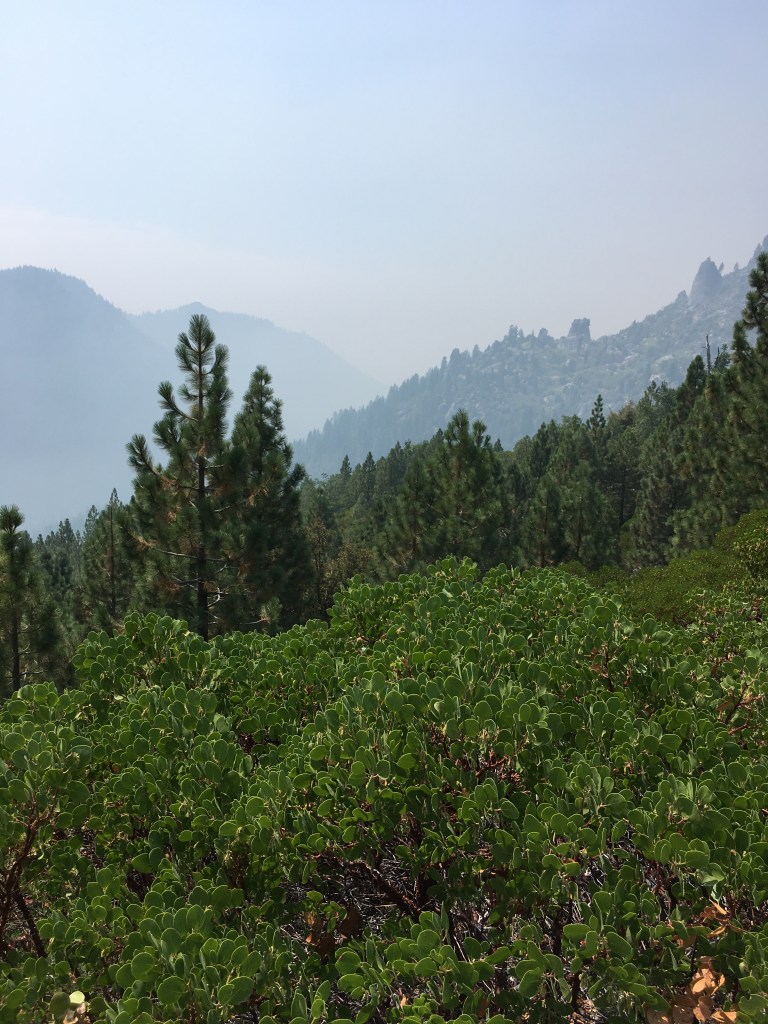
There are also the battles in Portland, Oregon between protestors and federal police. This has been going on for weeks now. Then a Black man named Jacob Blake was shot in the back by police in Kenosha, Wisconsin, leaving him paralyzed and prompting mass demonstrations. In the midst of one of these, a white 17-year old name Kyle Rittenhouse, carrying a long gun, ran through the crowd shooting and killed two people and wounded others.
My original question was, would we be able to deal with the climate crisis without shifting to an authoritarian regime? Could we get there and still be a democracy? The answer so far appears to be no, but what we’re seeing may just be what the path ahead looks like, with the outcome still undecided. Bernie didn’t get the nomination, which would have given us a legitimate way to make the necessary changes. Instead, Biden did, and he won’t do what’s necessary unless he’s pushed, so the pressure to change the way this country works has moved, as they say, “down-ballot,” meaning to local races, or within the Biden campaign to fighting for issues on the Party platform, appointments, etc.
Many people, myself included, believe it goes without saying that Trump if he is defeated will not leave the Presidency voluntarily; that he will dispute the election in every way possible. Therefore, on the path from here to there, there are going to be protests, disturbances in the streets, more shootings, more gatherings of protestors on both sides and battles in key cities, as the sides gather their forces. Down-ballot in the electoral process means city councils, regional agencies, courts, etc. Down-ballot in the streets means more demonstrations and counter-demonstrations.
Beach
We broke out of shelter-in-place and went to Santa Cruz and points south for a few days. On the board walk were these guys:

These are not the high school kids who are in desperate need of connecting with each other. These are old beach bums.
Other than that, the sand and water were a great rest for the eyes. Last time we were in this water it was at Vung Tau.
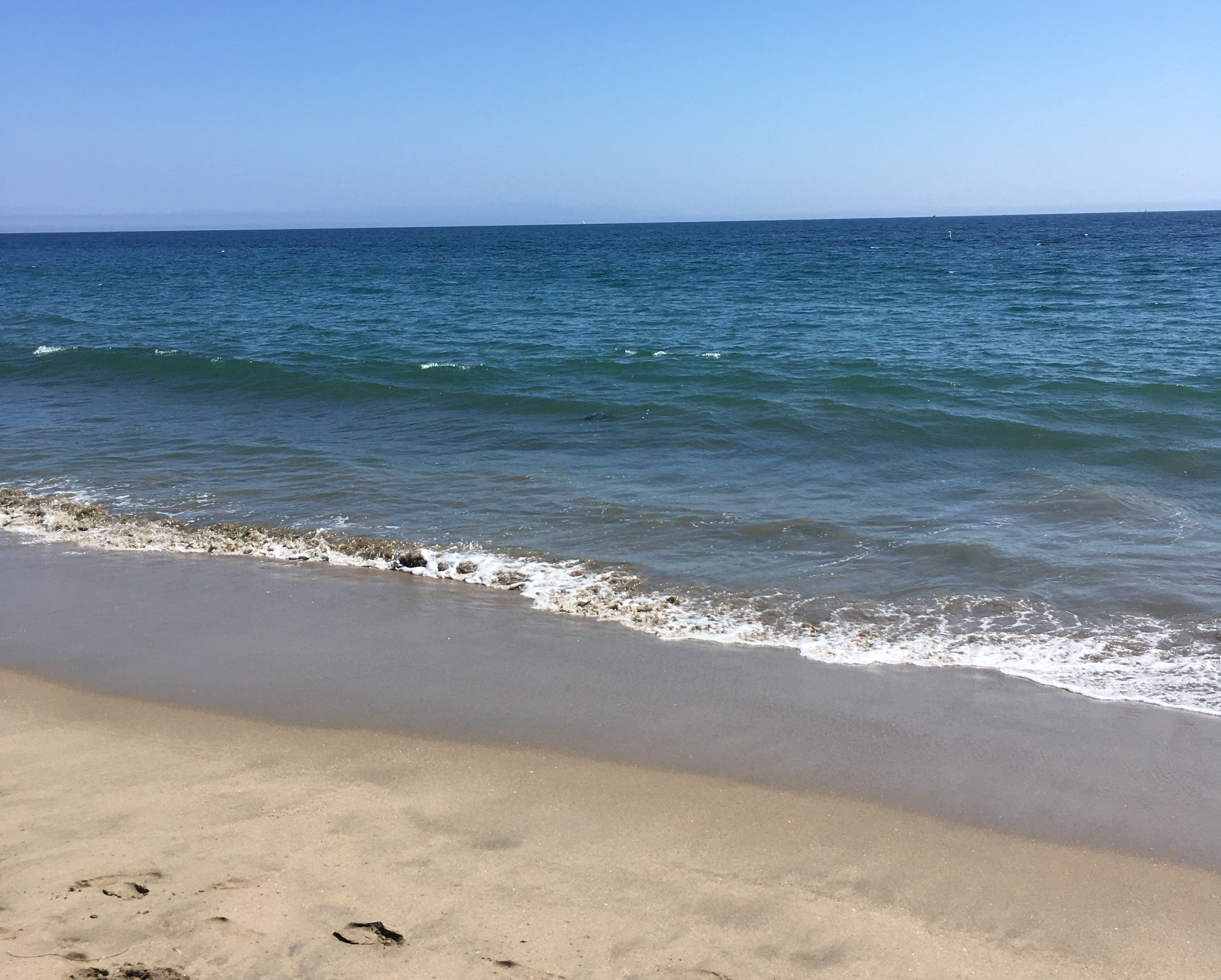
And in Watsonville, where the Pajaro river comes down from the Coast Range carrying light rich soil down to form the miles of level fields that encroach on the Pacific edge. That’s where strawberries, cabbage, and artichokes grow. This slough was saved from developers; just barely.

This enormous mansion overlooked those fields. This is just west of Highway 1, the Pacific Coast Highway.
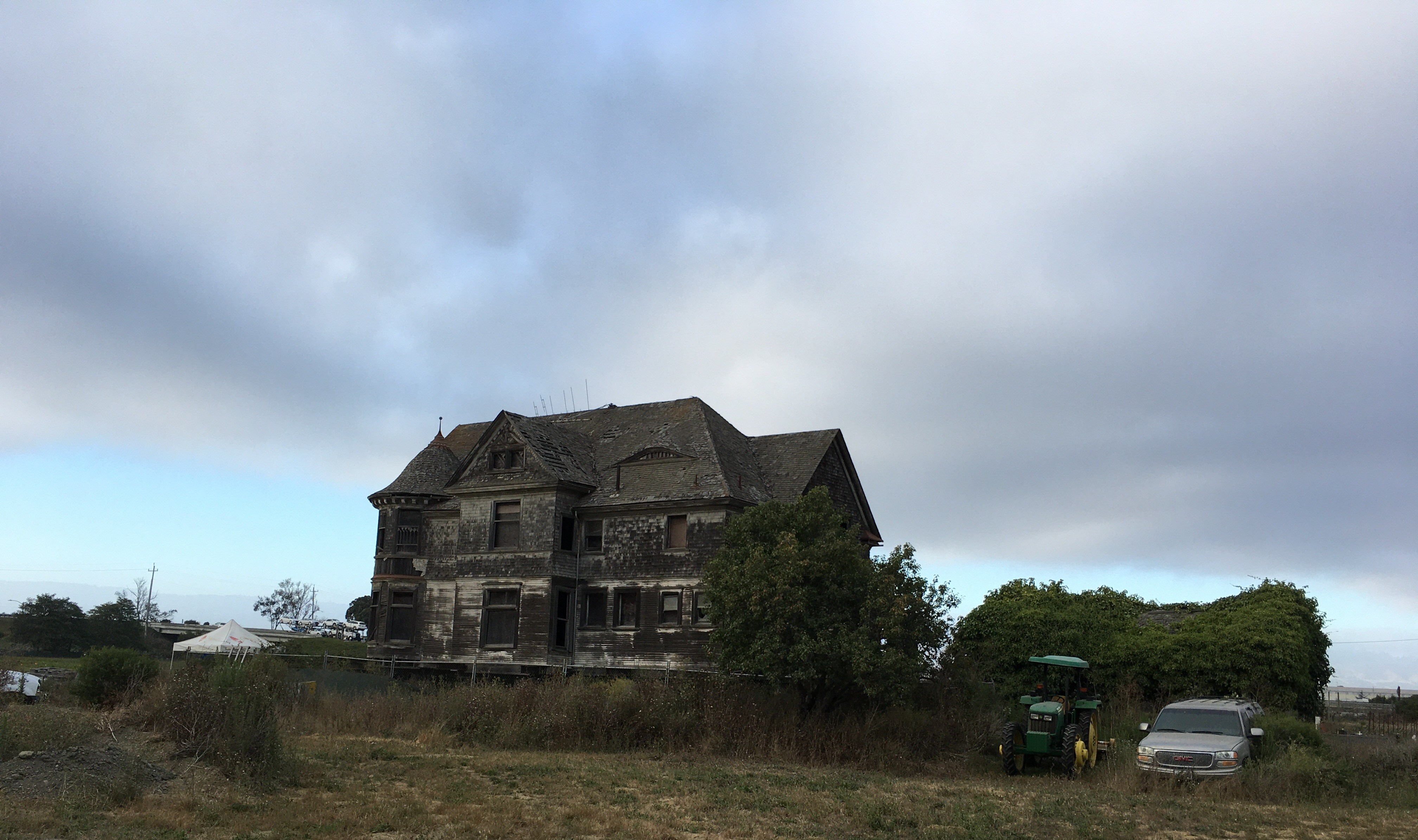
And across a frontage road this monster is rising– what is it? A convention center?
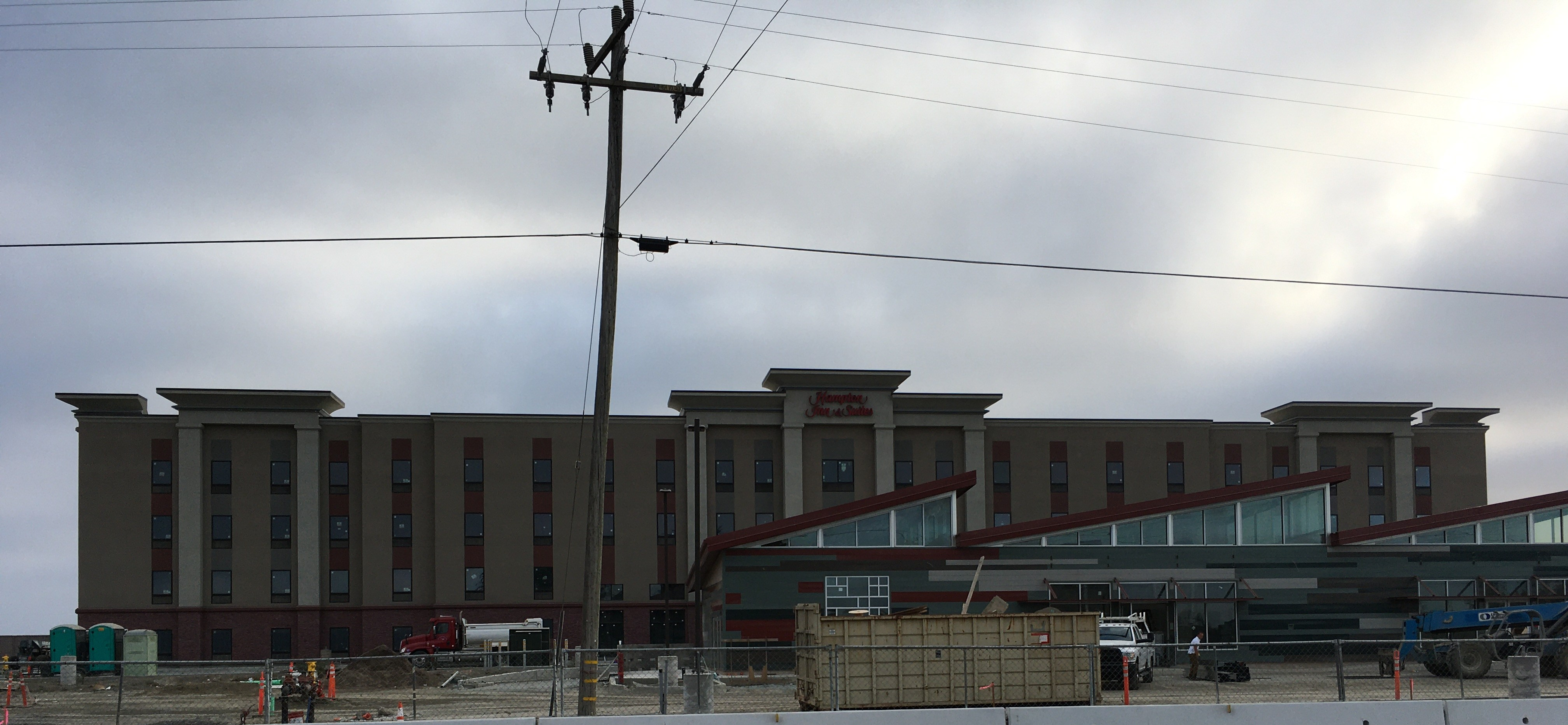
Heading north on Highway 1, marvelous beaches invisible from the road. It was Saturday so you could see cars parked — so what are all these people interested in? We go look.
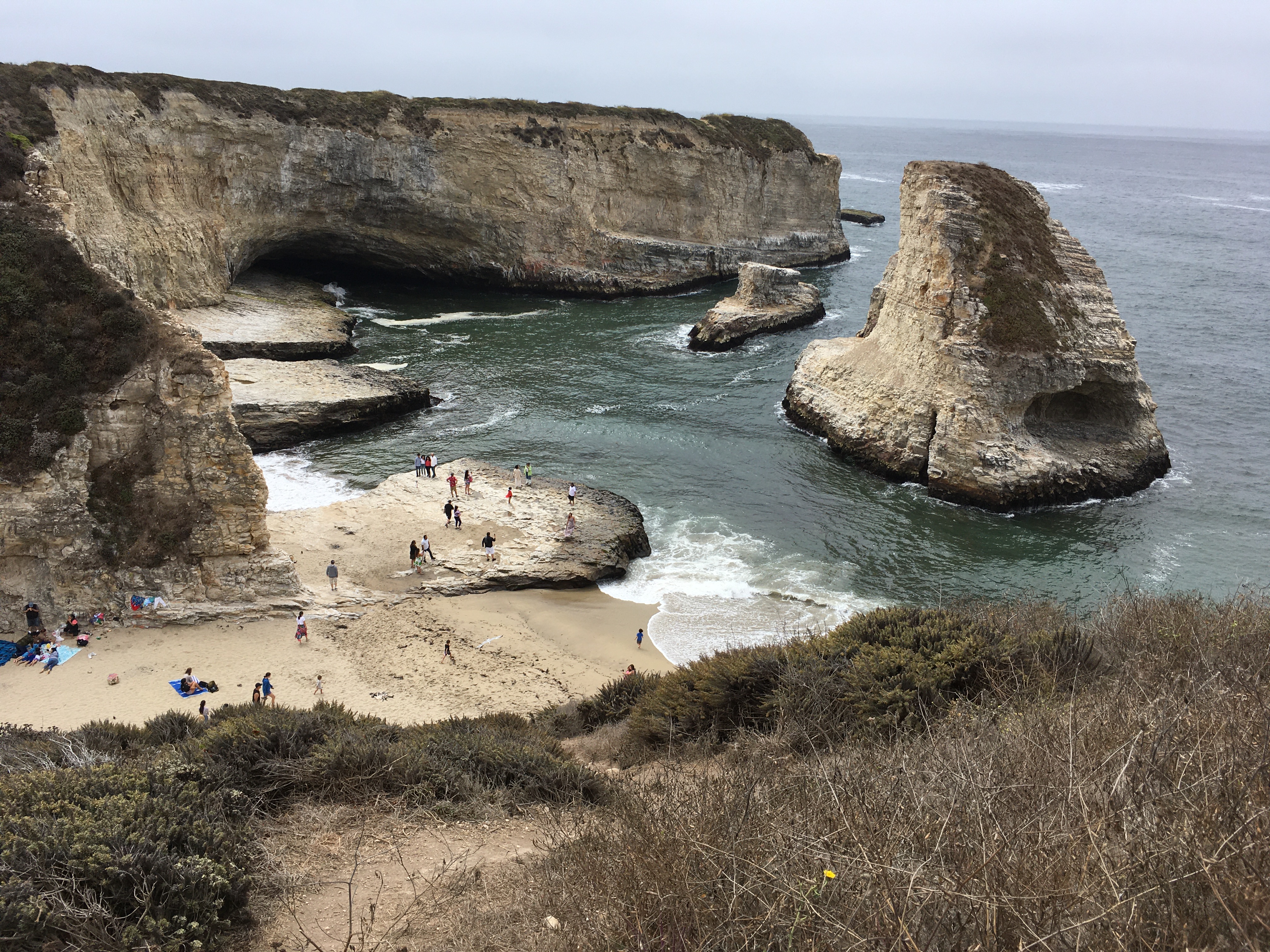
Pretty good social distancing, it looks like. And a field of lilies near Half Moon Bay:
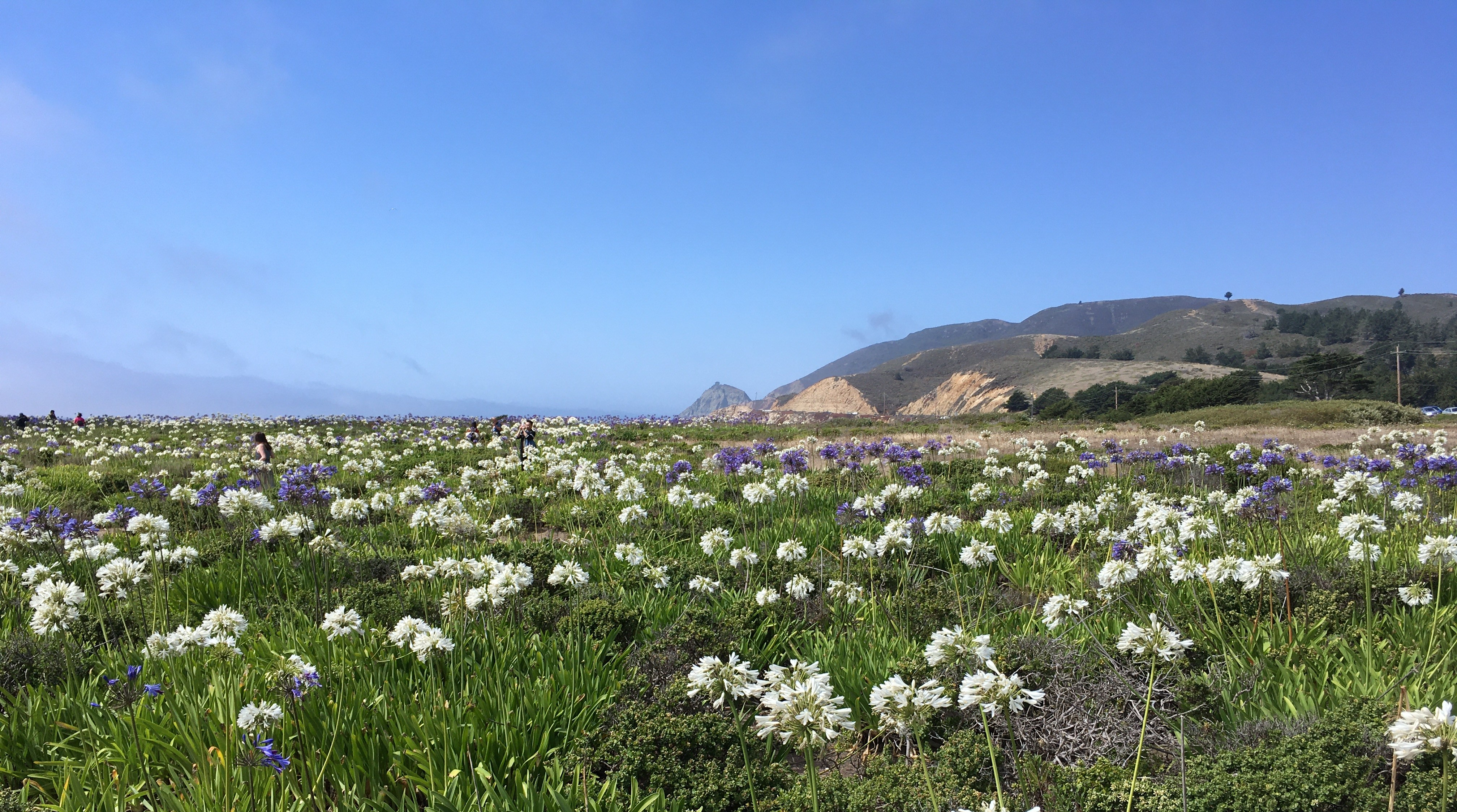
Swanton’s, which has a contract with the UFWs where you can get a union strawberry!!
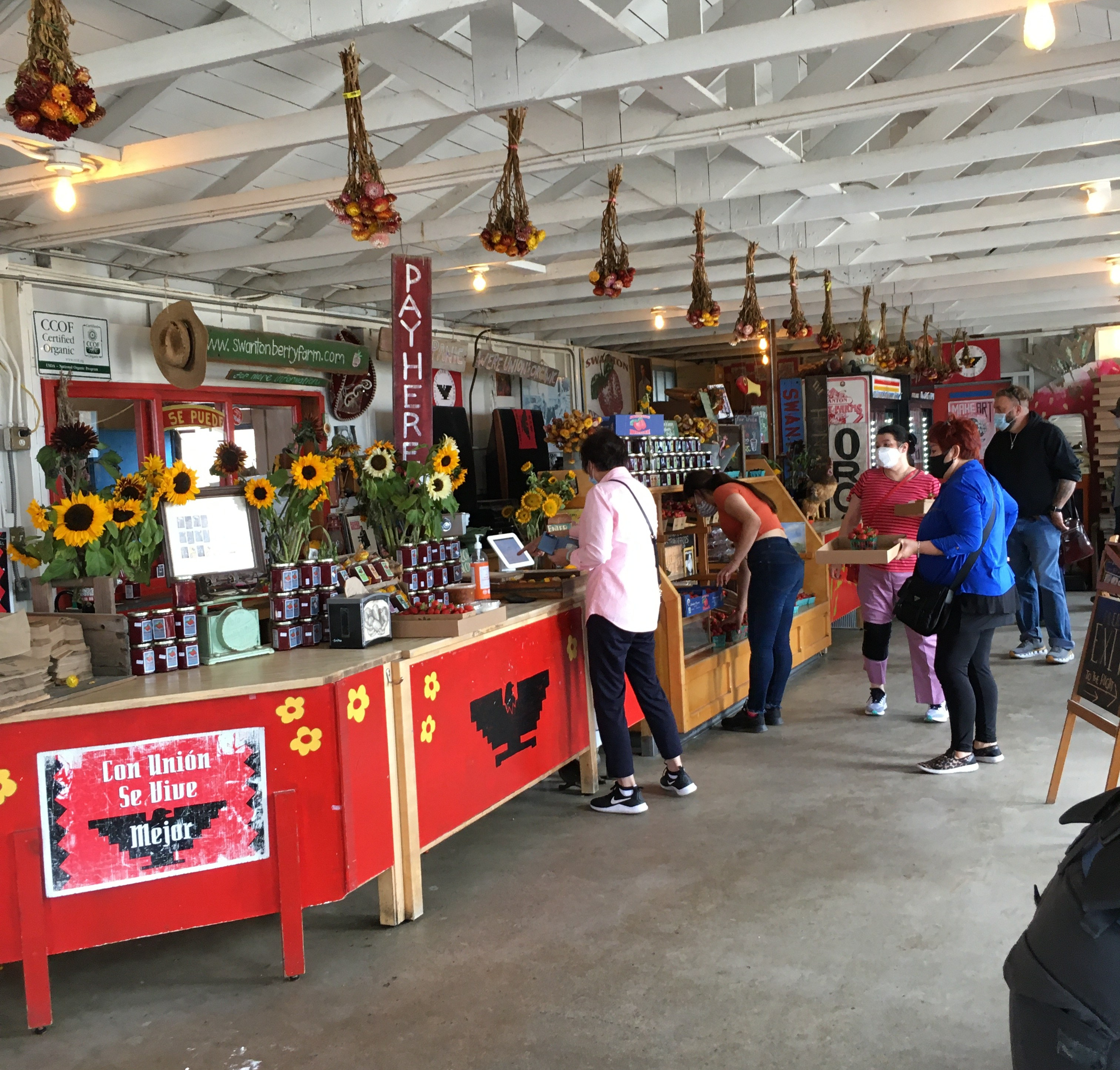
And so we return to Berkeley, where we find out that Kamala Harris is the VP pick — a good thing, quite a relief for me. She’s a fighter, very ambitious, smart, good-looking and can get nasty when necessary. She’s someone you can get behind. I am relieved.
But I also listened to a podcast that gamed out what the Republicans might do leading up to the election and between the election and the inauguration. The assumption is that Trump won’t accept the results if he doesn’t actually win. One possibility is that he’ll just declare victory no matter what, and defend it, using his “base” — which is very armed. Another is that if the Trump administration has to leave the government, it will do scorched earth: destroy all documents, hard drives, furniture, etc. This seemed to shock the interviewer. However, it’s what the leadership of IBT 743 did when it had to clear out and let the newly elected leadership move in. So you can learn from the labor movement, as it were.
8 minutes and 46 seconds at McDonalds
Demonstration at McDonalds last week, part of the nationwide Strike for Black Lives, that includes healthcare workers, fast food workers, “essential workers” of all sorts. McDonald’s has not provided adequate PPE for workers and many have gotten COVID-19.
Joe went to this demo and took photos;
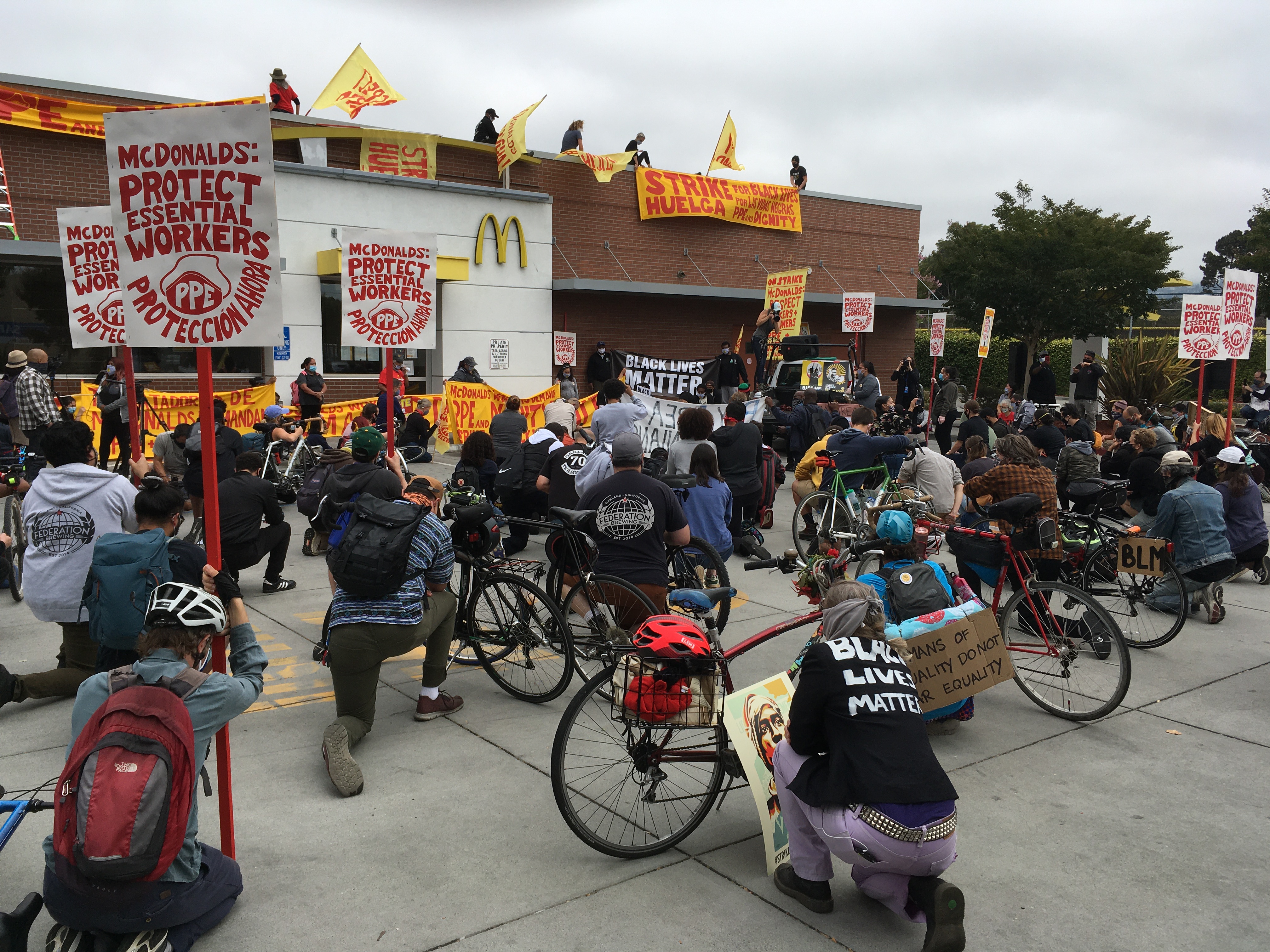
People are kneeling for the 8 minutes and 46 seconds that it took for Derek Chauvin to kill George Floyd. This is now an essential part of a demonstration.
The McDonalds was actually closed:
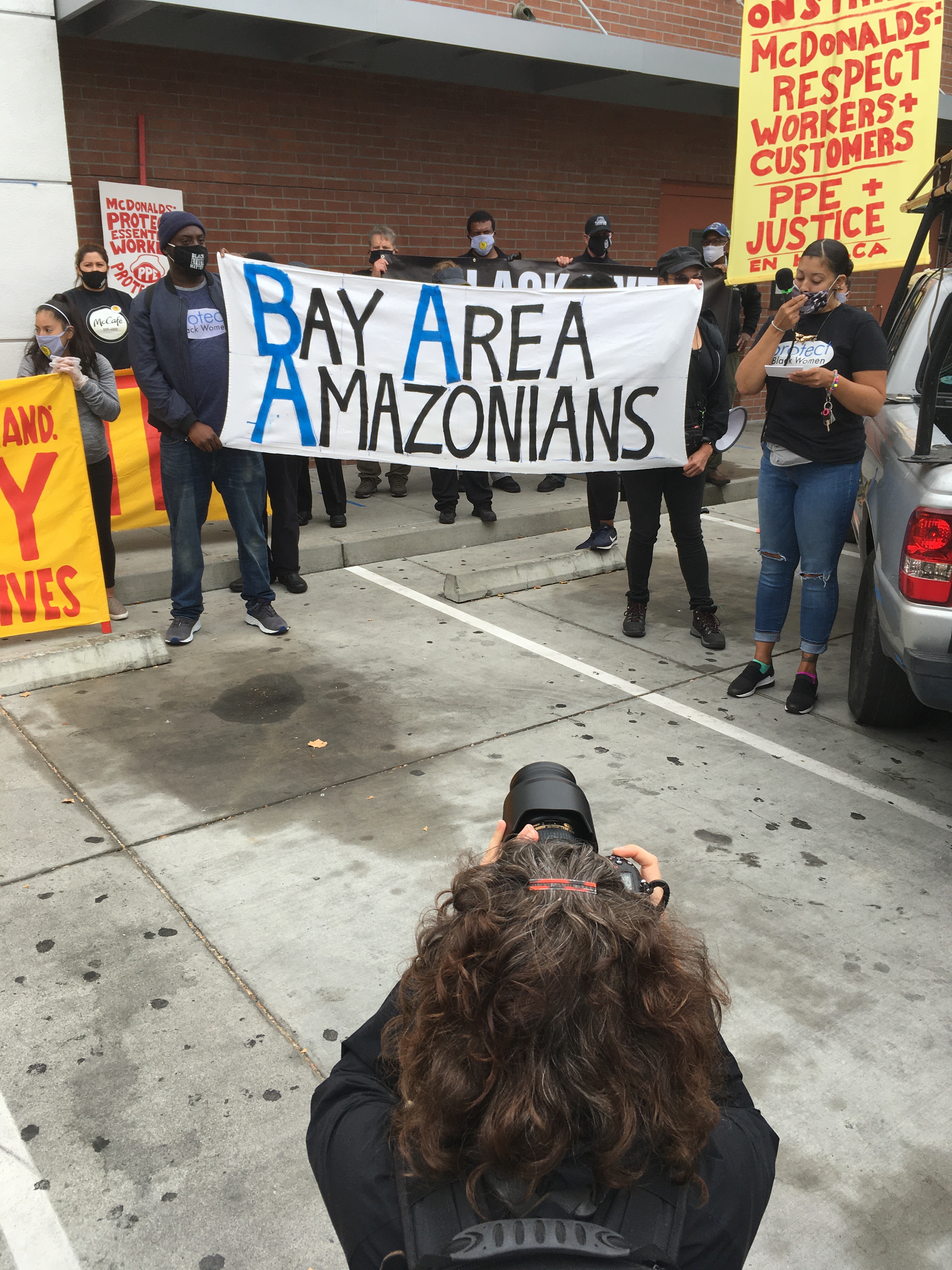
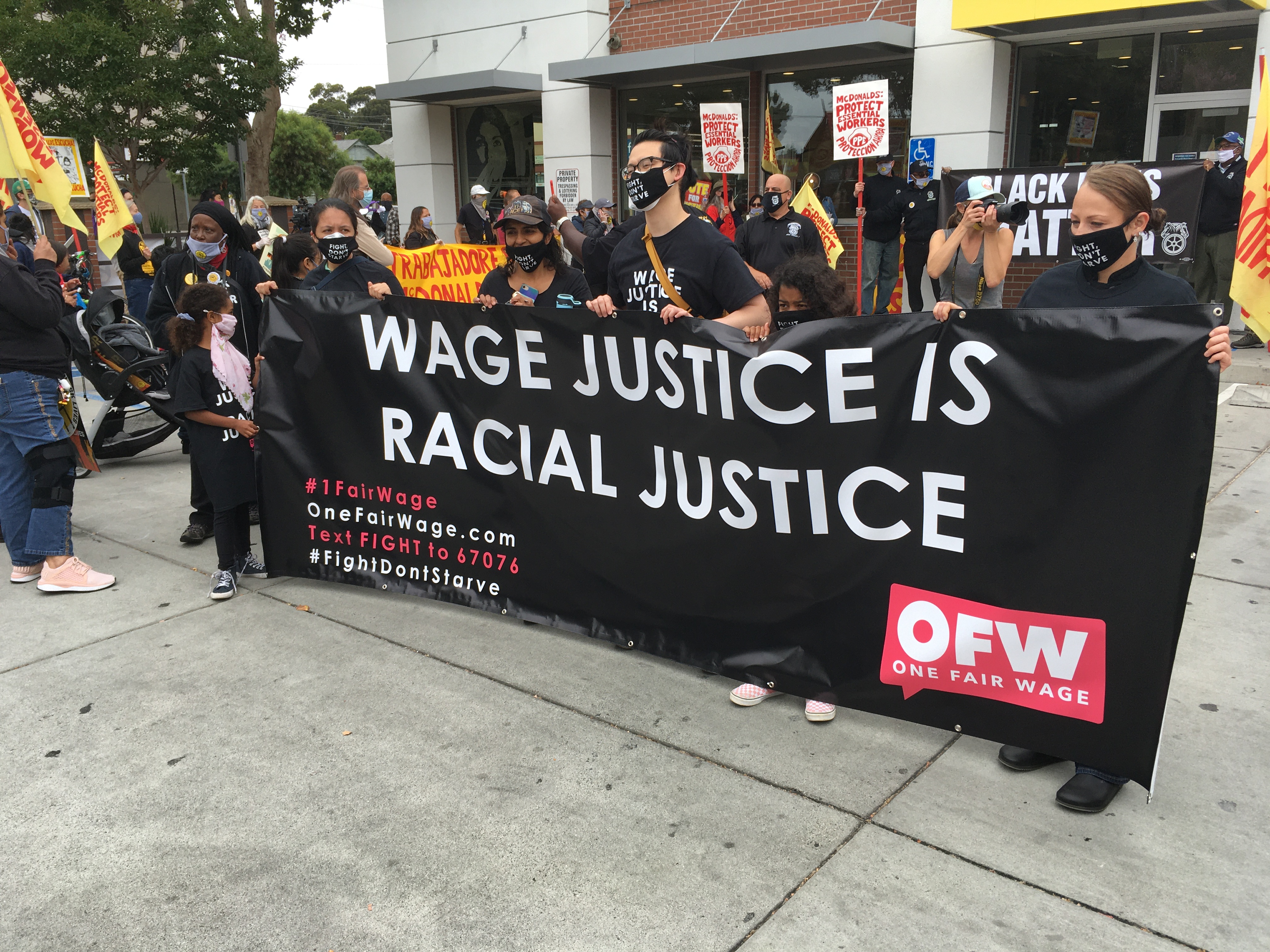
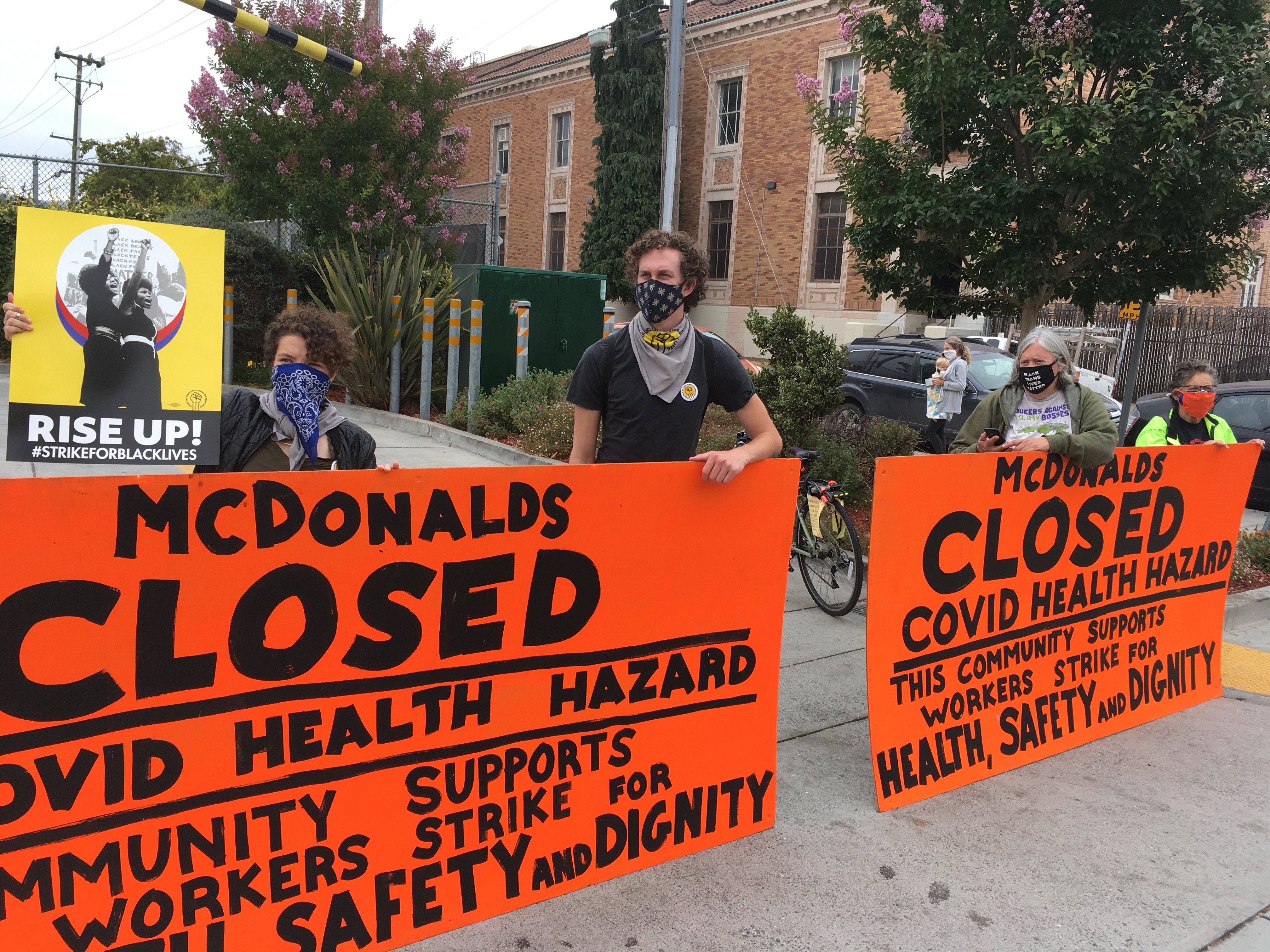
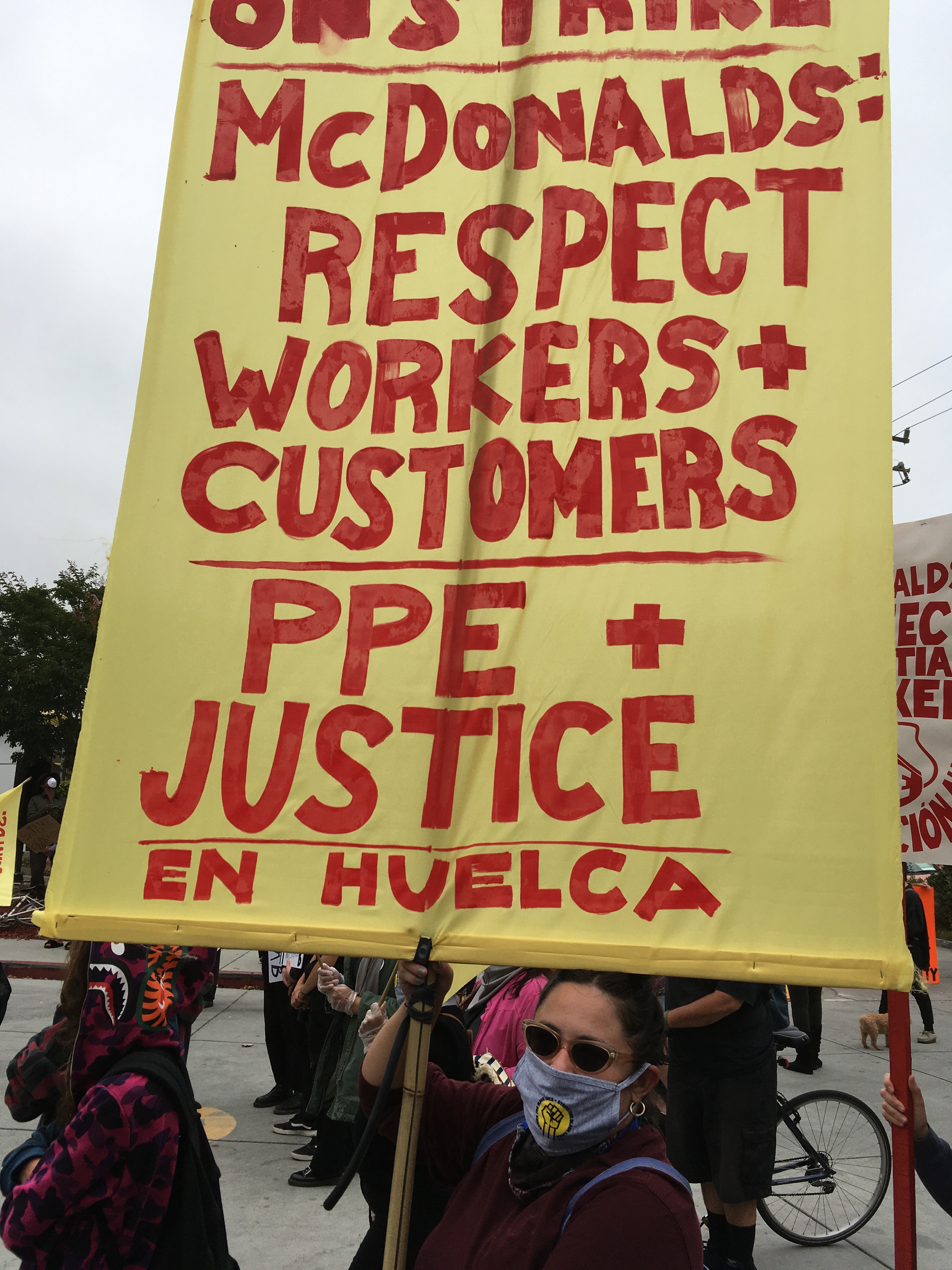
Why Vermont is safe
https://www.jamaicavermont.org/
As you know from previous posts on this blog, we have a house in a small bump-in-the-road village in Vermont. Actually, there is not even a bump. We tried to get a stop sign, so that logging trucks coming down the mountain would have to at least slow down as they go through the village, but the State Department of Transportation gave us a painted crosswalk instead, which soon was erased by traffic in the summer and snowplows in the winter.
The purpose of this blog entry is to explain to the many people from East Coast city environments who want to move to Vermont what “safe” actually means.
Safe because it’s poor, and thinly populated for the same reason
No doubt, Vermont has few COVID 19 cases. This message from the local hospital 9 miles away in Townshend explains the situation:
So even with the spikes in Londonderry and up on Stratton Mountain, it’s pretty safe. But why? Why is Vermont “safe”? Because this little hospital has great equipment, plenty of ventilators, high-tech doctors, etc? No. (It happens to be the smallest hospital in the United Sates.) Because Vermont has Medicare-for-All? (Not yet. It passed– Act 48 — but the Governor who had signed it, did not fund it.) Vermont is safe because it is poor and thinly populated, and those two are related.
Yes, it is beautiful, as the tourist industry has made sure everyone knows. Summer people love the clean rivers and cool nights. Ski people love the mountains and the snow. In between, people who live there all year round try to make a living off “outsiders” who bring in money. In the meantime, Vermonters do a lot of bartering and helping each other out. Food banks are important. Second hand shops are all over. Please note that the Grace Cottage Hospital link above not only talks reassuringly about the current case situation but also promotes an online auction to raise money. Last year they raised enough money to buy another hospital bed. So the people fleeing the pandemic in New York where nearly 23,000 people have died are coming to a place where the regional hospital holds an auction (of old furniture,mostly — “antiques”) to buy one hospital bed. Think about it.
“Hard to get to” is why it’s so great once you’re there
Our kids always stress out a lot when we try to get them to come to the old family home with its barn, sunny deck, large mowed yard, apple trees, well water, sumptuous fresh vegetables, dirt roads to bike on, quiet lakes, clean rivers, waterfalls, swimming holes with nobody in sight, etc etc. Why do they stress? Because, best case scenario, it is hard to get to. From the Bay Area if you fly Southwest you have to change in Chicago or St. Louis. Because of the time change you have to leave at 4 in the morning or earlier, and BART doesn’t run that early so you have to take a Lyft or a cab which basically adds another $60 to the price of your ticket. Then you sugar up on muffins and coffee at the airport and sit in a cramper and eat those awful pretzels for 5 hours while you pass over some of the most depressing wild deserts imaginable and think about climate change. Then comes Midway, if you’re lucky, because there’s a place at Midway to buy Greek food, but that’s followed by arriving late afternoon at Hartford followed by paying at least $100 to a friend from the village to come pick you up and drive you north another 2 or 3 hours.
That’s right, someone has to pick you up because there are no buses into Vermont from the airport. The only way to get even near by bus is if you fly into Boston on a red-eye and rush to get a once-a-day bus, and that will take you to Keene, New Hampshire and then you’re still nowhere near. Train? You can take a train to Chicago from Berkeley and get a sleeper, which is great, but once you’re in Chicago the train to Boston is grungy, takes surprisingly long, and you’ve still got to find someone to pick you up at the stop at Windsor Falls, near Hartford.
In other words, even Southern Vermont, which is the more civilized part of Vermont, is hard to get to unless you are driving yourself. Going up further north? The Northeast Kingdom might as well be Canada. Getting from our home to Burlington, which isn’t all the way north, takes about 6 hours, the first hour and a half involves going over Putney Mountain, harpin curves and sometimes pulling off the road to let someone else go by the other direction.
But the main question is, what about Internet?
So people from New York and up and down the East Coast, who can drive to Vermont on their own in just a few hours, are thinking, “Fresh air and cheap real estate? Hardly any cases of COVID-19?We work at home anyway, so why not? Let’s just move to Vermont!”
And then they ask about internet. Can they reliably get on zoom and carry out their stock brokering, their retail, their medical practice, their therapy or yoga practice, their international conferencing, etc. just like they could at home in New Jersey??
Along with being wild, full of fresh air, clean rivers, etc., Vermont also does not have a whole lot of people living there year-round. Nor do the people who live there year round use the internet a whole lot. There is talk about the “last mile” projects — getting services out to people who are living in remote farms on dirt roads that see traffic once a week, where the RR Postal Service leaves the mail in a box two or three miles from the house. (Should point out that austerity cuts to the PO have reduced even that service; the PO in our town is now open only very weird hours — like 9 am to 10:30 and then closed for two hours and opening again after lunch, which makes is hard for the postal clerk to plan her day.) “Last mile” service sounds good but the Consolidated Communications is a private business and the cost of ‘last mile” way exceeds the $30 a month or so that someone would be willing to pay for what basically means using Facebook as an email service. Towns, for example, don’t normally have websites. They may have a Facebook page. Some towns get grants from a foundation to have town meetings videoed.
I am getting questions from potential renters about how responsive is Consolidated Communications if you have a problem. ConComm, which is based in Mattoon, Illinois, took over Fairpoint a couple of years ago. CC does actually have customer service people staffing the phones in Vermont, which is great. But they are now being hit by people who suddenly want to move to Vermont and work on line and want hundreds of MBPS bandwidth. This is a shock. CC did not read the news coming out of Wuhan in February and think, “Wow, now everyone in New York is going to want to move to Vermont so we’ve got to staff up.” Yes, fiberoptic was supposedly installed (strung?) along Route 30 a few years ago. This did make a difference for us, at least in certain rooms of the house. I could suddenly use WhatsApp. But despite many books with whole chapters about pandemics and magazine articles about the relationship of climate change to disease vectors, nobody said, “Sheltering in place means working from home means decreased need for proximity to job locations which means moving somewhere safe and cheap which equals VERMONT! which means increased need for internet in Vermont!”
When I started getting VRBO inquiries back in May I called CC to get my internet service upgraded and the earliest date possible was mid-July. A month and a half waiting list. Turns out there is only a total amount of bandwidth available in our part of Vermont. The customer service rep explains it this way: “It’s like a parking lot. When it’s full and there are no more spaces, no one can come in. You have to wait until someone comes out. And no one is coming out these days.”
What about other problems that can happen?
Of course, internet depends on electricity just like our bodies depend on water, and anything involving electricity depends on wires coming from a power station. That means not only your clocks, your lights, and your internet but your well, too. It is likely that there will be a big storm. That’s how water gets here in the summer and snow gets here in the winter. Climate change is bringing bigger and bigger storms, we know that — our village lost four houses right in the village during the Hurricane Irene flood. So in a big storm, think about this. Route 30 sounds like a big highway, right? It’s a two-lane asphalt road overhung with old maples. In a big storm, it’s highly likely that somewhere between Brattleboro and Manchester, the two big towns about 60 miles apart, a tree will fall on the road and take down the telephone poles that carry the wires that bring electricity and other “services” to the village. No, we do not have undergrounded utilities. This is not a nice leafy suburb. Maybe a few years from now, when the property taxes rise to match the new prices that New Yorkers are paying (and they start paying Vermont state income taxes, too), we’ll do some more undergrounding so that the electricity doesn’t go out every times there’s a storm. But for now, a typical windstorm will rip out some ancient maple and smack it down across the road and if you’re lucky, it will not hit your car.
So who responds when a tree falls and the electricity (and your internet) goes out? Eventually, a sheriff will show up with a blinking blue light. After a while, the power company will send a truck and some guys with yellow vests to try to pull the pole back up and string up the wires. They may have to come from New Hampshire or even Massachusetts. Some of their crews are probably busy already elsewhere. They are very competent but they don’t hurry. And they have to come over a mountain which may not be in good shape itself, with more fallen trees.
But the first people on the scene are going to be nearby farmers with tractors and chain saws to get rid of the tree and haul away the logs. Or they might be the next person who comes along, who will probably be (if it’s not some software engineer from New York who is frantically pumping his phone to fin out what’s going on) a local who will have at least an ax in the back of his pickup, and probably a chain to haul things with. These guys all know each other and have done this many times before. But they are not official, they are not tax-funded, and you can’t get mad at them. They are what’s “responsive” in Vermont.
Oh, about cell service
While you’re waiting in your car for these guys (maybe women, too, actually) to clear the road, you may find that you’re in a place between towns (or in some towns, actually ) where there is no cell service so you can’t get on your phone and complain about what’s going on to someone who lives in a less benighted part of the country where they may die of COVID-19 but at least they have cell service. Townshend, for example, does not have cell service, last time I looked. and in our town the only cell service is through Verizon because Verizon rents out the church steeple for a cell tower. That’s a substantial part of the church budget right there.
By the way, “responsive” during Hurricane Irene meant that a couple of guys from the village got into their excavators and basically tore apart the flooded river and built a new road with the water running all over them. There were people stranded on the wrong side of the river during that storm. They appreciated the responsiveness.
Don’t misunderstand me
I am not trying to get people to not come to Vermont. We need the rent money. The town needs the income from people buying pine cone Christmas wreaths, maple syrup, cheese and patchwork aprons. They also need to have all these old farmhouses and village homes that have been on the market for years without selling, to get them sold and fixed up and lived in so that the village can start collecting the property taxes and business license taxes. Maybe someone will buy that old B&B and fix it up! The old fire station that’s been sitting empty for 20 years — wouldn’t that make a great house! Maybe with more money coming in, the village will be able to afford a town municipal water system! That’s right — the village is running on septic tanks; that’s why there aren’t any restaurants right on the main street. No restrooms, no restaurant.
But people who come to Vermont thinking that they are basically moving to a nicer part of their home city, with all the conveniences of a city without the density that means that you’re exposed to COVID — big hospitals, plenty of beds, shopping, internet, a power grid with backups, post offices open all day, actual police officers, a choice of gas stations and shops, etc etc — if we had that, we wouldn’t be someplace you’d want to come.
Black Lives Matter come to Vermont, too
Vermont and Iowa are the two whitest states in the union. (Our significant Abenaki population looks white to people like me; so does our Quebecois population which was not considered white back in the day). Nonetheless, Black Lives Matter has made it to Vermont. Note the reason given in this report from the Digger for not allowing a Black Lives Matter message to be written in chalk on the Route 30 bridge: “We’ve got people in this town who spend a lot of time and energy trying to beautify the town, and trying to keep it looking like a small Vermont town,”
Black Lives Matter art on Jamaica bridge spurs VTrans policy change
So one of the features of a small Vermont town is no recognition of racism; racism, like good internet, being a feature of cities.
Truck Fire
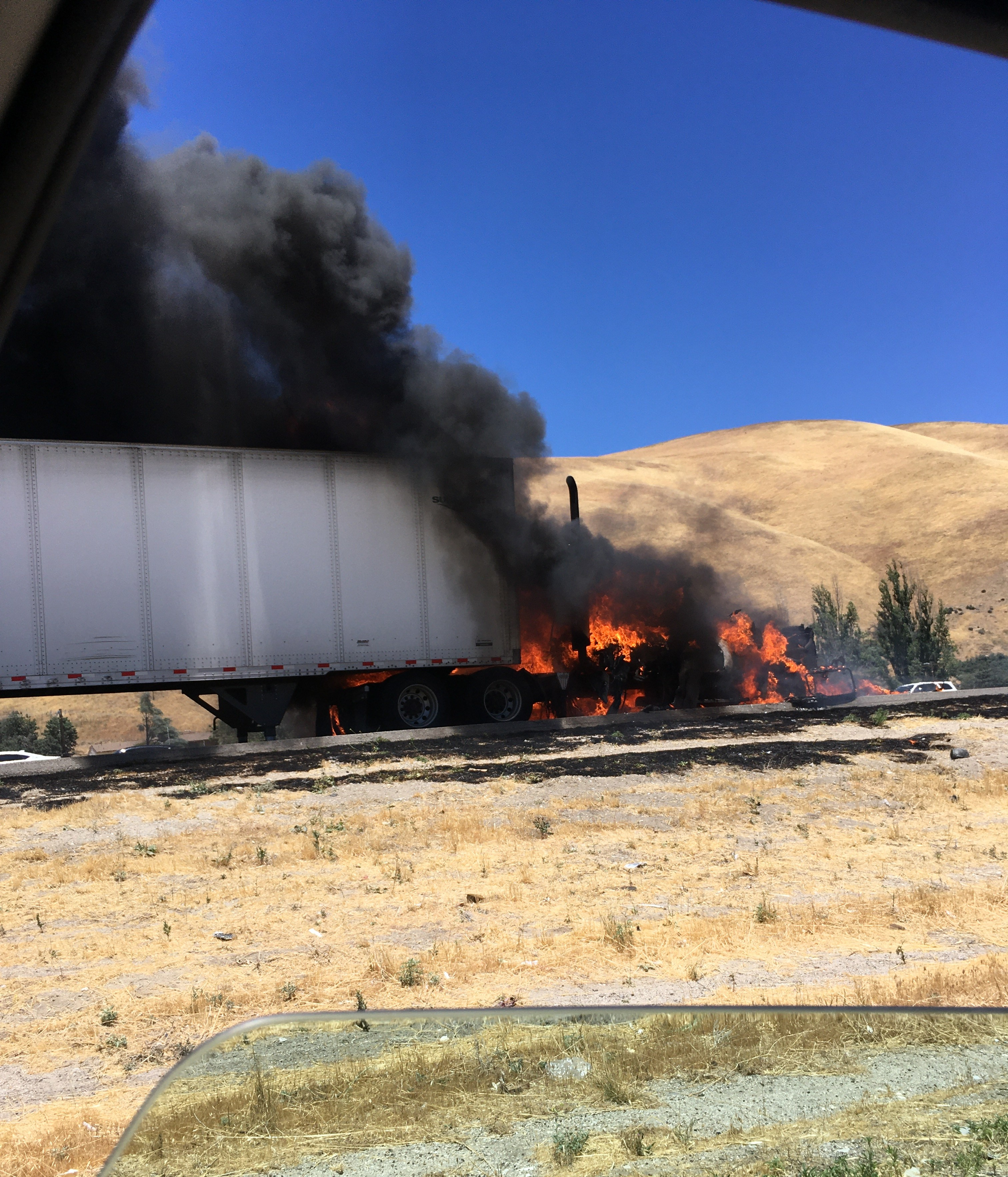
This seemed to pretty much say it all about what’s going on here now. I can’t resist another photo:
